Syrian Girl exposes the 'Assad backs Al-Qaeda' myth
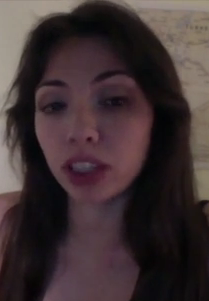
See also : Geneva II: US Orwellian subterfuge – Al-Qaeda acts as America's boots on the ground in Syria, 21 Jan 2014 by Ajamu Baraka on Global Research. For English language videos, visit Syria News Press, Syrian TV.
Misreporting: Photographs depict [government] war crimes in Syria: prosecutor by David Mark on ABC's PM program - never retracted, even though claims have been shown to be fraudulent.
Tim Anderson on Syria - Two interviews: Channel 7 bias and the Real Deal
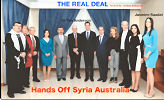 Inside, two interviews with Dr Tim Anderson, Sydney academic, on Syria. The first is by Channel 7 on 24 January 2014 and shows incredible bias. The second is by Journalist Joshua Blakeney, who interviewed Anderson and Hands Off Syria's Jasmine Saadat about their recent visit to Syria where they met with Syrian officials including the President of Syria Bashar al-Assad. The interview was conducted at a time when the pro-war Australian press was attempting to discredit members of Hands Off Syria Australia for meeting with members of the Syrian government. See inside for videos.
Inside, two interviews with Dr Tim Anderson, Sydney academic, on Syria. The first is by Channel 7 on 24 January 2014 and shows incredible bias. The second is by Journalist Joshua Blakeney, who interviewed Anderson and Hands Off Syria's Jasmine Saadat about their recent visit to Syria where they met with Syrian officials including the President of Syria Bashar al-Assad. The interview was conducted at a time when the pro-war Australian press was attempting to discredit members of Hands Off Syria Australia for meeting with members of the Syrian government. See inside for videos.This is supplied to readers of candobetter.net in order to balance Channel 7's ridiculously biased interview with Tim Anderson, which you may access here. 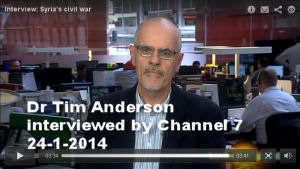
The second (larger picture) is the link to the longer and more intelligent interview.
The interview was recorded on January 12, 2014 and can be found archived on The Real Deal radio show's blog: http://radiofetzer.blogspot.ca
Aussi version of Creation - what happened to the blokes eventually

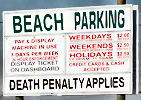 This story follows on from "The Aussie version of creation" an illustrated story which is circulating widely by email, author unknown. [If you are the author, please let candobetter.net know and they will acknowledge your work.] I copy it here to give the context in which the story of blokes arose, but I have updated the story with changes to conditions in Aussi Paradise.
This story follows on from "The Aussie version of creation" an illustrated story which is circulating widely by email, author unknown. [If you are the author, please let candobetter.net know and they will acknowledge your work.] I copy it here to give the context in which the story of blokes arose, but I have updated the story with changes to conditions in Aussi Paradise.

The Aussie verson of creation.
In the beginning God created day and night.
He created day for footy matches,
going to the beach.....
And BBQ's.......
He created night for going prawning,  sleeping
sleeping
and BBQ's, 
On the Second Day, God created water....
for surfing, swimming
swimming 
and BBQ's on the beach,
On the Third Day God created the Earth to bring forth plants  to provide malt and yeast for beer
to provide malt and yeast for beer 
and wood for BBQs,
On the Fourth Day God created animals
and crustaceans  for chops, sausages,
for chops, sausages,
steak and prawns for BBQ's 
On the Fifth day God created a Bloke  to go to the footy, enjoy the beach, drink the beer and eat the meat and prawns at BBQ's, and God saw that it was good.
to go to the footy, enjoy the beach, drink the beer and eat the meat and prawns at BBQ's, and God saw that it was good.
On the Sixth Day God saw that the Bloke was lonely and needed someone to go to the footy, surf, drink beer,  eat and stand around the barbie with.
eat and stand around the barbie with.
So God created Mates,  and God saw that they were good Blokes.
and God saw that they were good Blokes.
On the Seventh Day God looked around at the twinkling barbie fires,  heard the hiss of opening beer cans and the raucous laughter of all the Blokes. He smelled the aroma of grilled chops and sizzling prawns and
heard the hiss of opening beer cans and the raucous laughter of all the Blokes. He smelled the aroma of grilled chops and sizzling prawns and
God Saw that it was good .. ...
Well..... Almost good.....
He saw that the Blokes were too tired to clean up and needed a rest.
So God created Sheilas  to clean the house, to bear children, to wash, to cook and to clean the Barbie, and then God saw that it was not just good....
to clean the house, to bear children, to wash, to cook and to clean the Barbie, and then God saw that it was not just good....
It was Bloody Awesome!
IT WAS AUSTRALIA !!!!! 
The Story of blokes, continued - by Quark
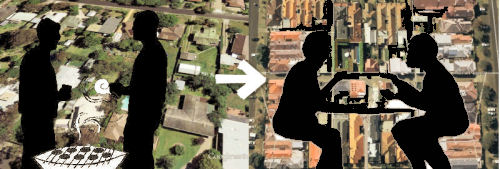
And that was pretty good for a while for most blokes and the sheilas didn’t mind it much either. They used to quite like BBQs in the back yard as it saved on washing up and the blokes did most of the work anyway. But as time went on, the back yards disappeared and so, fewer blokes could have BBQs with their mates and sheilas.
The blokes who couldn’t have bar-b q-s became quite aggro as they felt cooped up  which is natural as they had been created as BBQ loving creatures.
which is natural as they had been created as BBQ loving creatures.
The other thing that changed was that the sheilas could no longer spend all their time looking after children, cooking, cleaning "barbies" etc. as they had to go to work to help pay off the mortgage on the apartments sans backyards. 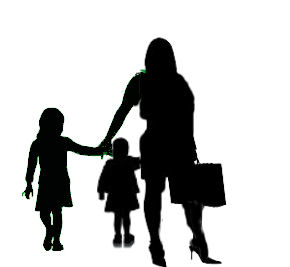
This, they were told by the newspapers,  was the way it was going to be for all blokes eventually in Australi-bloody –a and that they could no longer expect to have back yards with "barbies".
was the way it was going to be for all blokes eventually in Australi-bloody –a and that they could no longer expect to have back yards with "barbies".
This cut to the quick of blokes lives and affected their mental and physical health. Whilst blokes always had beer guts, they were starting to have more than that and to be actually obese 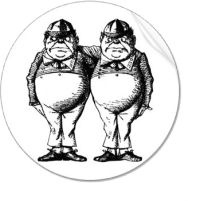 from all the fast food they had to eat on account of the sheilas no longer having time to cook.
from all the fast food they had to eat on account of the sheilas no longer having time to cook.
The other problem for blokes was that whilst they used to love going to the footy, they also liked to kick a footy around with their mates. This became harder as the local footy grounds and playing fields disappeared under masses of town houses.  The blokes became quite sad but they did not know quite what they were sad about as they still had their beer even though the barbies had gone.
The blokes became quite sad but they did not know quite what they were sad about as they still had their beer even though the barbies had gone.
The blokes had really enjoyed surfing, swimming and fishing as the sea and rivers had been created for this purpose. But around the same time as the back yards disappeared the blokes started to have trouble parking their utes at the beach.
A whole lot of signs started appearing at their favourite places saying they only had two hours for a day of surfing and swimming and, what’s more, they had to pay for the privilege! 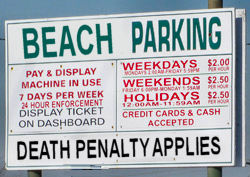
This made the blokes furious because they used to be free to do what they bloody well liked in Australi-bloody –a.
Then these blokes got older and got a bit used to not getting their own way. They started reminiscing with their mates instead of trying to do all these blokey things. A new lot of blokes cropped up who never knew that you could have a day at the beach and not have to worry about parking.
These blokes were different and seemed happy to sit in cafés with drinks that you would expect sheilas to like such as cappa –bloody chinos and café –bloody- lattes whilst playing with their mobile bloody phones  which were not created by God, unlike the sea and the plants for the malt and the yeast for the beer and the sheilas and the crustaceans.
which were not created by God, unlike the sea and the plants for the malt and the yeast for the beer and the sheilas and the crustaceans.
And the other bloody fly in the ointment for the blokes was that, whilst they used to have plenty of time for surfing and swimming and fishing after work and on their “sickies”, most of these blokes, one by one, lost their bloody public service jobs or permanent sort of cushy jobs even in the private sector and had to go onto contracts.  This bloody meant that they were even working when they weren’t being paid in the time that they would have been surfing and swimming! What’s more they didn’t get “sickies” or if they did they didn’t have time to take them or they’d lose their jobs!
This bloody meant that they were even working when they weren’t being paid in the time that they would have been surfing and swimming! What’s more they didn’t get “sickies” or if they did they didn’t have time to take them or they’d lose their jobs!
The blokes who virtually had owned the bloody place no longer seemed to! It was as though the place that had belonged to all blokes to enjoy and do as they bloody well pleased now belonged to a few blokes that they didn’t even know and who seemed to live in castles somewhere and even had houses overseas or owned whole islands.  They were not regular blokes. The regular blokes sort of lost their "blokiness" when they were put in this position. They started to agree with the blokes they didn’t know who now seemed to own the bloody place. Maybe the blokes thought this was the way for them to own the place again…
They were not regular blokes. The regular blokes sort of lost their "blokiness" when they were put in this position. They started to agree with the blokes they didn’t know who now seemed to own the bloody place. Maybe the blokes thought this was the way for them to own the place again…
Meanwhile what was happening to the sheilas? Well the sheilas never thought they owned the place unless they were rich sheilas, but that didn’t matter because the sheilas could go where they pleased and it was as good as owning the joint. So when the backyards disappeared around the same time as the parking signs went up at the beach and the blokes lost their cushy jobs with ‘sickies”, the sheilas who had got equal pay to the blokes a few decades earlier also lost their cushy jobs with “sickies” and found themselves on contracts.
Just as the blokes were stuck at work when they could have gone swimming, so were the sheilas. The sheilas still had to have the babies but other sheilas were hired to look after lots of babies while the sheilas who had the babies went to work to pay the mortgage for the apartment or the house with not even enough land for a BBQ.
The blokes and the sheilas had to race to the child care centre before and after work to drop off and pick up the babies. Life for both blokes and sheilas became a balancing act to maintain a life without BBQs, surfing and swimming.
But most blokes and sheilas were very appreciative of the large flat screen teles that were the centerpieces of all living rooms in Australi-bloody- a.

It had all happened so insidiously, the blokes didn’t realise. And that’s the story of blokes.
Full speech of Syrian Foreign Minister Walid al-Moallem to Geneva conference
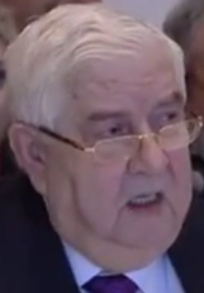 Update, 8 Jan 2014: Nowhere in the Australian mainstream print or broadcast media is Walid Al-Moallem's speech printed, or even adequately paraphrased.
Like the (mis)reporting in all the Australian msm, the stories in the Fairfax Sydney Morning Herald, linked to below, fail to report anywhere the Foreign Minister's insistence that the Syrian people, and not the Geneva 2 Conference attendees, decide at an election whether or not Bashar al-Assad remain as President of Syria: Syria's Foreign Minister clashes with UN Secretary General Ban Ki-moon at peace conference, Fiery exchanges over Assad's fate at talks, Syrian peace talks degenerate into acrimony, After angry opening, Syrian regime holds out hope for talks, Syria to allow women and children to leave besieged city.
|
In his opening address to the Geneva 2 Peace conference on 22 January 2014, published by SANA, Syrian Foreign Minister Walid Al-Moallem gave a comprehensive account of the terrorist war of aggression that has, according to some estimates, cost Syria 100,000 lives in almost three years since March 2011. His speech named other conference attendees, including the United States, Israel and the Arab dictatorships of Qatar and Saudi Arabia as the principle perpetrators of these crimes. This speech was also published on Global Research on 22 Jan 2013.
|
|
Geneva2 begins with participation of Syria's official delegation, headed by al-Moallem
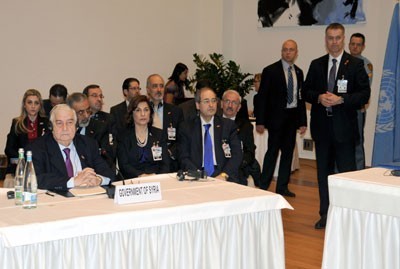
Montruex, (SANA) - The international conference on Syria, Geneva2, kicked off on Wednesday morning with the participation of Syria's official delegation, headed by Deputy Premier, Foreign and Expatriates Minister, Walid al-Moallem.
Minister al-Moallem said at the opening session of the conference:
Ladies and Gentlemen,On behalf of the Syrian Arab Republic,SYRIAN – steeped in history for seven thousand years.ARAB – proud of its steadfast pan-Arab heritage despite the deliberate acts of aggression of supposed brotherly Arabs.REPUBLIC – a civil state that some, sitting in this room, have tried to return to medieval times.Never have I been in a more difficult position; my delegation and I carry the weight of three years of hardship endured by my fellow countrymen - the blood of our martyrs, the tears of our bereaved, the anguish of families waiting for news of a loved one - kidnapped or missing, the cries of our children whose tender fingers were the targets of mortar shelling into their classrooms, the hopes of an entire generation destroyed before their very eyes, the courage of mothers and fathers who have sent all their sons to defend our country, the heartbreak of families whose homes have been destroyed and are now displaced or refugees.
Al-Moallem: My delegation and I carry the hope of a nation for the years to come
My delegation and I also carry the hope of a nation for the years to come – the right of every child to safely go to school again, the right of women to leave their homes without fear of being kidnapped, killed or raped; the dream of our youth to fulfill their vast potential; the return of security so that every man can leave his family safe in the knowledge that he will return.
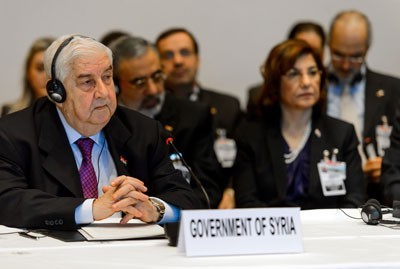
Finally, today, the moment of truth; the truth that many have systematically tried to bury in a series of campaigns of misinformation, deception and fabrication leading to killing and terror. A truth that refused to be buried, a truth clear for all to see – the delegation of the Syrian Arab Republic representing the Syrian people, the government, the state, the Army and the President - Bashar al-Assad.
It is regrettable that seated amongst us are representatives of countries that have the blood of Syrians on their hands
It is regrettable, Ladies and Gentlemen, that seated amongst us today in this room, are representatives of countries that have the blood of Syrians on their hands, countries that have exported terrorism along with clemency for the perpetrators, as if it was their God given right to determine who will go to heaven and who will go to hell. Countries that have prevented believers from visiting holy places of worship whilst abetting, financing and supporting terrorists. Countries that gave themselves the authority to grant and deny legitimacy to others as they saw fit, never looking at their own archaic glasshouses before throwing stones at acclaimed fortified towers. Countries that shamelessly lecture us in democracy, in development and in progress whilst drowning in their own ignorance and medieval norms. Countries that have become accustomed to being entirely owned by kings and princes who have the sole right to distribute their national wealth granting their associates whilst denying those who fall out of favor.
They lectured Syria – a distinguished, virtuous, sovereign state, they lectured her on honour whilst they themselves were immersed in the mud of enslavement, infanticide and other medieval practices. After all their efforts and subsequent failures, their masks fell from their quivering faces, to reveal their perverse ambitions. A desire to destabilize and destroy Syria by exporting their national product: terrorism. They used their petrodollars to buy weapons, recruit mercenaries and saturate airtime covering up their mindless brutality with lies under the guise of the so-called " Syrian revolution that will fulfill the aspirations of the Syrian people."
Ladies and Gentlemen, how is what has happened and continues to plague Syria, meeting these aspirations? How can a Chechen, Afghani, Saudi, Turkish or even French and English terrorists deliver on the aspirations of the Syrian people, and with what? An Islamic state that knows nothing of Islam except perverse Wahhabism? Who declared anyway that the Syrian people aspire to live thousands of years in the past?
In Syria, the wombs of pregnant women are butchered and their foetuses killed
In Syria, Ladies and Gentlemen, the wombs of pregnant women are butchered and their foetuses killed; women are raped, dead or alive, in practices so heinous, so vile and repulsive that they can only be attributed to their perverse doctrine. In Syria, Ladies and Gentlemen, men are slaughtered in front of their children in the name of this revolution; worse still, this is done whilst the children of these foreign perpetrators sing and dance. In Syria, how can so-called revolutionaries cannibalize a man's heart and claim to promote freedom, democracy and a better life?
Under the pretext of the "Great Syrian Revolution," civilians, clergymen, women and children are killed, victims are indiscriminately blown up in streets and buildings regardless of their political views or ideologies; books and libraries are burned, graves are dug up and artifacts stolen. In the name of the revolution, children are killed in their schools and students in their universities, women are extorted in the name of jihad al-nikah and other forms, mosques are shelled whilst worshipers kneel at prayer, heads are severed and hung in the streets, people are burned alive in a true holocaust that history and many countries will deny without being accused of anti-Semitism.
In the name of a revolution, "to free the oppressed Syrian people from the regime and to spread democracy," does a father blow himself up with his wife and children to prevent foreign intruders from entering his home? Most of us in this room are fathers - I ask you then, what would compel a man to kill his own family to protect them from freedom fighting monsters. This is what happened in Adra, a place that most of you have not heard of but where the same alien monsters attacked: killing, looting, beheading, slaughtering, raping and burning people alive. You have heard nothing of this brutality for sure, yet you have heard of other places where the same heinous crimes were committed and where the same blood soaked finger was pointed at the Syrian Army and government. And when these flagrant lies were no longer credible, they stopped spinning their web of deceit.
This is what their masters ordered them to do, these countries that spearheaded the war against Syria, trying to increase their influence in the region with bribes and money, exporting human monsters fully soaked in abhorrent Wahabi ideology, all at the expense of Syrian blood. From this stage, loud and clear, you know as well as I do that they will not stop in Syria, even if some sitting in this room refuse to acknowledge or consider themselves immune.
Ladies and Gentlemen, everything you have heard would not have been possible, had our border sharing countries been good neighbours during these challenging years. Unfortunately they were far from it; with backstabbers to the North, silent bystanders to the truth in the West, a weak South accustomed to doing the bidding of others, or the tired and exhausted East still reeling from the plots to destroy it along with Syria.
Mimsery and destruction, wich has engulfed Syria, has been made possible by the decision of Erdogan's government
Indeed, this misery and destruction, wich has engulfed Syria, has been made possible by the decision of Erdogan's government to invite and host these criminal terrorists before they entered into Syria. Clearly, oblivious to the fact that magic eventually turns on the magician, it is now beginning to taste the sour seed it has sown. For terrorism knows no religion, and is loyal only unto itself. Erdogan's government has recklessly morphed from a zero problems with its neighbours policy to zero foreign policy and international diplomacy altogether, crucially leaving it with zero credibility.
Nevertheless, it continued on the same atrocious path falsely believing that the dream of Sayyid Qutb and Mohammad Abdel Wahab before him was finally being realized. They wreaked havoc from Tunisia, to Libya, to Egypt and then to Syria, determined to achieve an illusion that only exists in their sick minds. Despite the fact that it has proven to be a failure, they nevertheless are still determined to pursue it. Logically speaking, this can only be described as stupidity, because if you don't learn from history, you will lose sight of the present; and history tells us: if your neighbor's house is on fire, it is impossible for you to remain safe.
Some neighbours started fires within Syria whilst others recruited terrorists from around the globe – and here we are confronted with shockingly farcical double standards: 83 nationalities are fighting in Syria - nobody denounces this, nobody condemns it, nobody reconsiders their position - and they impertinently continue to call it a glorious SYRIAN Revolution! While when a few scores of young resistant fighters supported the Syrian Army in a few places, all hell broke loose and it suddenly became foreign intervention! Demands were made for the departure of foreign troops and the protection of Syrian sovereignty and for it not to be violated. Here I affirm, Syria - the sovereign and independent state, will continue to do whatever it takes to defend herself with whatever means it deems necessary, without paying the least bit of attention to any uproar, denunciations, statements or positions expressed by others. These have been and always will be Syria's sovereign decisions.
They imposed sanctions on our food, our bread and our children's milk
Despite all of this, the Syrian people remained steadfast; and the response was to impose sanctions on our food, our bread and our children's milk. To starve the population, pushing them into sickness and death under the injustice of these sanctions. At the same time, factories were looted and burned, crippling our food and pharmaceutical industries; hospitals and healthcare centers were destroyed; our railroads and electricity lines sabotaged, and even our places of worship - Christian and Muslim – were not spared their terrorism.
When all of this failed, America threatened to strike Syria, fabricating with her allies, Western and Arab, the story about the use of chemical weapons, which failed to convince even their own public, let alone ours. Countries that celebrate democracy, freedom and human rights regrettably only choose to speak the language of blood, war, colonialism and hegemony. Democracy is imposed with fire, freedom with warplanes and human rights by human killing, because they have become accustomed to the world doing their bidding: if they want something, it will happen; if they don't, it won't. They have heedlessly forgotten that the perpetrators who blew themselves up in New York follow the same doctrine and come from the same source as those blowing themselves up in Syria. They have heedlessly forgotten that the terrorist that was in America yesterday is in Syria today, and who knows where he will be tomorrow. What is certain, however, is that he will not stop here. Afghanistan is an ideal lesson for anyone who wants to learn – anyone! Unfortunately, most do not want to learn; neither America nor some of the ‘civilized' western countries that follow its lead, starting from the city of lights to the kingdom over which "the sun never set," in the past; despite the fact that they have all felt the bitter taste of terrorism in the past.
And then suddenly they became "Friends of Syria." Four of these ‘friends' are autocratic, oppressive monarchies that know nothing of a civil state or democracy, whilst others are the same colonial powers which occupied, pillaged and partitioned Syria less than one hundred years ago. These so called ‘friends' are now convening conferences to publicly declare their friendship with the Syrian people, whilst covertly facilitating their hardship and destroying their livelihoods. They openly express their outrage over the humanitarian plight of Syrians whilst deceiving the international community of their complicity. If you were truly concerned about the humanitarian situation in Syria, you would remove your strangle hold on her economy by lifting the sanctions and the embargo, and by partnering with her government in tightening security by fighting the influx of weapons and terrorists. Only then can we assure you that we will be well as we once were, without your deep concern for our wellbeing.
Some of you may be asking yourselves: Are foreigners the sole manufacturers of the happenings in Syria? No Ladies and Gentlemen, Syrians amongst us here, having been legitimized by foreign agendas, have played a contributing role as facilitators and implementers. They did this at the expense of Syrian blood and the people whose aspirations they claim to represent, whilst they themselves were divided hundreds of times and their leaders on the ground were fleeing far and wide. They sold themselves to Israel becoming her eyes on the ground, and her fingers on the trigger for Syria's destruction; and when they failed, Israel intervened directly to reduce the capabilities of the Syrian Army and thus ensuring the continued implementation of her decades old plan for Syria.
Our people were being slaughtered while opposition figures legitimized by foreign agendas were living in five star hotels
Our people were being slaughtered while they were living in five star hotels; they opposed from abroad, met abroad betraying Syria and selling themselves to the highest foreign bidder. And yet, they still claim to speak in the name of the Syrian people! No, Ladies and Gentlemen, anyone wishing to speak on behalf of the Syrian people cannot be a traitor to their cause and an agent for their enemies. Those wishing to speak on behalf of the people of Syria should do so from within her borders: living in her destroyed houses, sending their children to her schools in the morning not knowing if they will return safe from mortar shelling, tolerating the freezing cold winters because of the shortage in heating oil and queuing for hours to buy bread for their families because sanctions have prevented us from importing wheat when we were once exporters. Anyone wanting to speak in the name of the Syrian people should first endure three years of terrorism, confronting it head on, and then come here and speak on behalf of the Syrian people.
Syria has welcomed hundreds of international journalists and facilitated their mobility
Ladies and gentlemen,
the Syrian Arab Republic – people and state, has fulfilled its duties. It has welcomed hundreds of international journalists and facilitated their mobility, security and access; and they in turn have reflected the stark and horrific realities they witnessed to their audiences, realities that have perplexed many Western media organisations who couldn't bear their propaganda and narrative being exposed and contradicted. The examples are too many to count. We allowed international aid and relief organizations into the country, but the clandestine agents of certain parties sitting here, obstructed them from reaching those in dire need of aid. They came under terrorist attack several times, whilst we, as a state, did our duty in protecting them and facilitating their work. We issued numerous amnesties and released thousands of prisoners, some even members of armed groups, at the anger and dismay of their victim's families; these families though, like the rest of us, ultimately accepted that Syria's interests come before anything else, and hence we must conceal our wounds and rise above hatred and rancor.
What have you done, you who claim to speak on behalf of the Syrian people. Where is your vision for this great country? Where are your ideas or your political manifesto? Who are your agents of change on the ground other than your armed criminal gangs? I am certain that you have nothing and this is only too apparent in the areas that your mercenaries have occupied or to use your words "liberated."
In these areas, have you freed the population or have you hijacked their moderate culture to enforce your radical and oppressive practices? Have you implemented your development agenda by building schools and health centres? No, you have destroyed them and allowed polio to return after it had previously been eradicated in Syria. Have you protected Syria's artifacts and museums? No, you have looted our national sites for your personal profit. Have you demonstrated your commitment to justice and human rights? No, you have enforced public executions and beheadings. In short, you have done nothing at all except muster the disgrace and shame of begging America to strike Syria. Even the opposition, over which you are the self-appointed masters and guardians, do not acknowledge you or the methods in which you manage your own affairs, let alone the affairs of a country.
A country they want to homogenize; not in the sectarian, ethnic or religious sense, but rather in a warped ideological sense. Anyone against them, whether Christian or Muslim, is an infidel; they killed Muslims of all sects and targeted Syrian Christians with severity. Even nuns and bishops were targeted, kidnapping them after they attacked Ma'loula, the last community that still speaks the language of Jesus Christ. They did all this to force Syrian Christians to flee their country. But little did they know, that in Syria we are one. When Christianity is attacked all Syrians are Christians, when mosques are targeted all Syrians are Muslims. Every Syrian is from Raqqa, Lattakia, Sweida, Homs or the bleeding Aleppo when any one of these places is targeted. Their abhorrent attempts to sow sectarian and religious sedition will never be embraced by any levelheaded Syrian. In short, Ladies and Gentlemen, your "glorious Syrian revolution" has left no mortal sin uncommitted.
There is another side to this dark gloomy picture. A light at the end of the tunnel shinning through the Syrian people's determination and steadfastness, the Syrian Army's courage in protecting our citizens and the Syrian state's resilience and perseverance. During everything that has happened, there are states that have shown us true friendship, honest states that stood on the side of right against wrong, even when the wrong was clear for all to see. On behalf of the Syrian people and state, I would like to thank Russia and China for respecting Syria's sovereignty and independence. Russia has been a true champion on the international stage strongly defending, not only with words but also with deeds, the founding principles of the United Nations of respecting the sovereignty of states. Similarly China, the BRICS countries, Iran, Iraq and other Arab and Muslim countries, in addition to African and Latin American countries, have also genuinely safeguarded the aspirations of the Syrian people and not the ambitions of other governments for Syria.
The Syrian people, like other people of the region, aspire to more freedom, justice and human rights
Yes, Ladies and Gentlemen, the Syrian people, like other people of the region, aspire to more freedom, justice and human rights; they aspire to more plurality and democracy, to a better Syria, a safe, prosperous and healthy Syria. They aspire to building strong institutions not destroying them, to safeguarding our national artifacts and heritage sites not looting and demolishing them. They aspire to a strong national army, which protects our honour, our people and our national wealth, an army that defends Syria's borders, her sovereignty and independence. They do not, Ladies and Gentlemen, aspire to a mercenary army ‘Free' to kidnap civilians for ransom or to use them as human shields, ‘Free' to steal humanitarian aid, extort the poor and illegally trade in the organs of living women and children, ‘Free' to canibalise human hearts and livers, barbequing heads, recruiting child soldiers and raping women. All of this is done with the might of arms; arms provided by countries, represented here, who claim to be championing "moderate groups". Tell us, for God's sake, where is the moderation in everything I have described?
Where are these vague moderate groups that you are hiding behind? Are they the same old groups that continue to be supported militarily and publicly by the West, that have undergone an even uglier face-lift in the hope of convincing us that they are fighting terrorism? We all know that no matter how hard their propaganda machine tries to polish their image under the name of moderation, their extremism and terrorism is one and the same. They know, as we all do, that under the pretext of supporting these groups, al-Qaeda and its affiliates are being armed in Syria, Iraq and other countries in the region.
This is the reality, Ladies and Gentlemen, so wake up to the undeniable reality that the West is supporting some Arab countries to supply lethal weapons to al-Qaeda. The West publically claims to be fighting terrorism, whilst in fact it is covertly nourishing it. Anyone who cannot see this truth is either ignorantly blind or willfully so in order to finish what they have begun.
Is this the Syria that you want? The loss of thousands of martyrs and our once cherished safety and national security replaced with apocalyptic devastation. Are these the aspirations of the Syrian people that you wanted to fulfill? No, Ladies and Gentlemen, Syria will not remain so, and that is why we are here. Despite all that has been done by some, we have come to save Syria: to stop the beheadings, to stop the cannibalizing and the butchering. We have come to help mothers and children return to the homes they were driven out of by terrorists. We have come to protect the civil and open-minded nature of the state, to stop the march of the Tatars and the Mongols across our region. We have come to prevent the collapse of the entire Middle East, to protect civilization, culture and diversity, and to preserve the dialogue of civilizations in the birthplace of religions. We have come to protect tolerant Islam that has been distorted, and to protect the Christians of the Levant. We are here to tell our Syrian expatriates, to return to their home country because they will always be foreigners anywhere else, and regardless of our differences we are all still brothers and sisters.
We have come to stop terrorism as other countries that have experienced its bitter taste have done, whilst affirming loudly and consistently that a dialogue between Syrians is the only solution; but as with other countries that have been struck by terrorism, we have a constitutional duty to defend our citizens and we shall continue to strike terrorism that attacks Syrians regardless of their political affiliations. We have come to hold those accountable, for as long as particular countries continue to support terrorism, this conference will bear no fruit. Political pluralism and terrorism cannot coexist in the same landscape. Politics can only prosper by fighting terrorism; it cannot grow in its shadow.
We are here as representatives of the Syrian people and the state; but let it be clear to all, – and experience is the best proof – that nobody has the authority to grant or withdraw legitimacy from a president, a government, a constitution, a law or anything else in Syria except Syrians themselves; this is their constitutional right and duty. Therefore, whatever agreement is reached here will be subject to a national referendum. We are tasked with conveying our people's desires, not with determining their destiny; those who want to listen to the will of the Syrian people should not appoint themselves as their spokesperson. Syrians alone have the right to choose their government, their parliament and their constitution; everything else is just talk and has no significance.
Finally, to all those here and everyone watching around the world: in Syria we are fighting terrorism, terrorism which has destroyed and continues to destroy; terrorism which since the 1980's Syria has been calling, on deaf ears, for a unified front to defeat it. Terrorism has struck in America, France, Britain, Russia, Iraq, Afghanistan, Pakistan; the list goes on and it continues to spread. Let us all cooperate to fight it, let's work hand in hand to stop its black, horrifying and obscurantist ideology. Then, let us as Syrians stand united to focus on Syria and start rebuilding its social fabric and material structures. As I said, dialogue is the foundation to this process, and despite our gratitude to the host country, we affirm that the real dialogue between Syrians should in fact be on Syrian soil and under Syrian skies. Exactly one year ago, the Syrian government put forward its vision for a political solution; think of how much innocent blood we would have saved had some countries resorted to reason instead of terrorism and destruction. For a whole year, we have been calling for dialogue, but terrorism continued to strike at the Syrian state, her people and institutions.
Today, in this gathering of Arab and Western powers, we are presented with a simple choice: we can choose to fight terrorism and extremism together and to start a new political process, or you can continue to support terrorism in Syria. Let us reject and isolate the black hands and the false faces, which publicly smile but covertly feed terrorist ideology, striking Syria today, but ultimately spreading to infect us all. This is the moment of truth and destiny; let us rise to the challenge.
Thank you
Appendix 1: Intervention at the Geneva ll International Conference on Syria - John Kerry
Thank you very much, Secretary Ban, and thank you, Ambassador Brahimi, for your commitment to helping the Syrian people find a new future. And I join with Foreign Minister Lavrov in thanking all of the countries around the table, all of the groups around the table. I thank President Burkhalter and the people of Switzerland for making this important meeting possible. And I thank the Russian Federation and Foreign Minister Lavrov for his cooperation and efforts together with us, working to try to initiate this process. I also want to welcome the leaders of the Syrian opposition, and I thank them for the courageous decision they've made. Everybody here knows the pressures that have existed.
Today is a beginning. It's a beginning of what will obviously be a tough and complicated negotiation; peace talks to end a war and to end a struggle like this always are tough. Frankly, this is a test for all of us who support the Syrian people in their effort to end the extraordinary suffering that the world has witnessed, and which continues. And it is a test of the global community's ability to come together and ultimately secure a Syria where people can live in dignity and not in fear.
I want to start by saying that I think it is impressive, I think it is significant in and of itself, that so many countries have come together, even though we know it's for one day that all the countries will be here in this forum. But all of them have come together because everybody understands how critical it is for the world to prove that we have the ability to make a difference in this kind of a conflict.
Now, lost in the daily reports of violence is the fact that this revolution did not begin as an armed resistance. This started peacefully. It was started by schoolboys in Daraa who are armed only with graffiti cans, citizens who were peacefully and legitimately calling for change. And they were met almost immediately with violence. When their parents came out to protest the arrest of the children, 120 people died. That was the beginning.
And tragically, the Assad regime answered peaceful demonstration after peaceful demonstration with ever-increasing force. In the three years since then, this conflict has now left more than 130,000 dead, and it's hard to count accurately. We all know that. The fact is that these people have been killed by guns, by tanks, by artillery, by gas, by barrel bombs, by Scud missiles. They've been killed by weapons almost exclusively of the magnitude not possessed by the opposition. Starvation has been used as a weapon of war. And most recently, we have seen horrific reports of systematic torture and execution of thousands of prisoners. This is an appalling assault, not only on human lives, but on human dignity and on every standard by which the international community tries to organize itself, recognizing the horrors of the humanitarian catastrophe that has unfolded, the destabilization of neighboring countries, and the endless exile of refugees.
As a result, the international community came together 18 months ago to support the Syrian people as they sought to change course. Now, this has taken a lot longer than many of us wanted to bring everyone together. But we have come here determined as ever to implement the Geneva communique. Sergey Lavrov just mentioned the Geneva communique; I reiterate the Geneva communique. And the Geneva communique can only be implemented through the concerted efforts of everybody in this room. Millions of people are relying on the international community's ability to help find a solution that can save their lives and their country. And we see only one option: a negotiated transition government formed by mutual consent.
Now, we need to deal with reality here. We really need to deal with reality. Mutual consent, which is what has brought us here, for a transition government means that that government cannot be formed with someone that is objected to by one side or the other. That means that Bashar Assad will not be part of that transition government. There is no way – no way possible in the imagination – that the man who has led the brutal response to his own people could regain the legitimacy to govern. One man and those who have supported him can no longer hold an entire nation and a region hostage. The right to lead a country does not come from torture, nor barrel bombs, nor Scud missiles. It comes from the consent of the people. And it's hard to imagine how that consent could be forthcoming at this point in time.
So just as there could be no place for the perpetrator of this violence, there could also be no place for the thousands of violent extremists who spread their hateful ideology and worsen the suffering of the Syrian people. And as we hear talk about terrorism today, make no mistake: It is the presence of the current intransigence within the existing government that makes this problem worse. That is creating a magnet for terrorists. And until a transition takes place, there is no prayer of reducing the increase of terrorism.
There is another way forward. We all know it. It is what this conference is organized around. It is the Geneva communique, which has the support of the international community as a peaceful roadmap for transition. And the only thing standing in its way is the stubborn clinging to power of one man, one family. I believe the alternative vision of the Syrian people is one that can gather the respect and support of people all around the world. It is a place that doesn't force people to flee or live in fear, a Syria that protects the rights of every group. We have not only an opportunity, but we have an obligation to find a way forward so that the people of Syria can choose their leadership, know peace, and for 9 million refugees, finally be able to return home in dignity.
Appendix 2: United Nations Secretary General tries to prevent Syrian Foreign Minister from speaking
Appendix 3: Video debate about Geneva 2 conference
The Debate - Deep Divide (P.1)
The Debate - Deep Divide (P.2)
Topic:
Greek government apologises for delay to Syrian delegation's flight, claims delay was unintentional
In turn, Olympic Air apologized to the crew of the plane and the official and media delegation, saying that the delay was caused by reasons beyond its control, adding that the plane has been refueled and took off towards its original destination.
The private plane carrying the delegation left Syria on Tuesday morning and landed at Athens International Airport around 12 PM Damascus time. Upon its arrival there, the pilot was informed that it cannot be refueled due to the European sanctions imposed on Syria, despite having all the proper clearances for entering the airspace of the concerned countries and landing and refueling at the aforementioned airport. This caused the plane to wait for four hours.
The official delegation informed the UN office in Geneva of the situation, and that the office promised to make the necessary calls to ensure that the plane is refueled.
This delay resulted in the head of the delegation, Deputy Prime Minister, Foreign and Expatriates Minister Walid al-Moallem, being unable to reach Montreux, Switzerland, in time for his scheduled meeting with UN Secretary-General Ban Ki-moon on the eve of the begining of the international conference on Syria "Geneva 2."
Whittling away of green wedge in Frankston threatens wildlife
by Craig Thomson, wildlife carer
Whittling away of green wedge in Frankston threatens wildlife
As a wildlife rescuer I am expressing my concerns that of the rezoning of 42 hectares from the green wedge at Stotts Lane. These concerns are for the welfare of the local wildlife and the added pressure placed on voluntary wildlife groups who have provided the Frankston city council a free service for over 25 years.
Habitat clearance is the greatest threat that faces our wildlife today and the land in question would further deplete what was a significant bio-link between the listed RAMSAR Seaford wetlands and the listed RAMSAR Westernport wetlands.
This land is an important habitat corridor for Koalas. Every spring male koalas migrate from Cranbourne Botanical gardens to mate with the female population that lives in Frankston South. Since the opening of Peninsula link there has been two male koalas killed on the freeway, and if this vital link was lost the South Frankston Koala population would be locally extinct in a number of years.
With the continual loss of habitat in this area especially due to the new freeway, and with very little to no offsets found in the city of Frankston. There is increased competition for habitat amongst wildlife, and as such more vulnerable species such as sugar gliders and woodland birds especially the likes of the eastern yellow robin will also become locally extinct.
With the loss of habitat and increased volume of traffic and increased number of domestic animals for such housing on green wedge land, local wildlife shelters are faced with a number of problems:
1 An increase of wildlife that needs care
2 Less habitat to release rehabilitated wildlife
This means:
1 We need to find more volunteers to help run our shelters
2 We need find more funds to rehabilitate and feed wildlife
3 If we are unable to meet those needs we have limit our services which obviously causes stress to both us and the community member we are unable to help.
4. If we are unable to find suitable habitat to release wildlife we have to look at other areas for releasing wildlife reducing genetic viability and biodiversity of an area.
Kind regards
Craig Thomson
Secretary Animalia Wildlife Shelter
PO Box 4002 Frankston Heights
Victoria 3199
NB: Stotts Lane was part of the Mornington Peninsula Shire. There has also been a lot of work on this as well by Barry Ross and the Frankston Environmental Friends Network. This story has massive implications for the green wedges of Melbourne and of course the future survival of Koalas in sth Frankston. This issue should become the focal point of it instead of a housing development and benefit a greedy developer who lives in Toorak.
The site forms part of the Mornington Peninsula Green Wedge and lies outside the UGB. Frankston City Council’s Environment Department have concerns about changes to the UGB (urban growth boundary) generally, and more specifically in the Stotts Lane area because of potential impacts on a habitat link along the Peninsula Link corridor.
Coincidently, Planning Minister recently claimed that Melbourne has 25 years for more housing expansion, at the expense of native habitats, food bowls and wildlife.
“We now have a complete picture for Victoria. It’s clear that there is plenty of land for future development and plans to maintain supply. It is critical that we continue to identify land to drive industry, jobs and housing growth in regional centres,” Mr Guy said.
Premier Victoria media release: Melbourne leads the nation in catering for population growth
Perhaps our Premier and Planning minister Matthew Guy should spend a day rescuing wildlife hit on the roads, feeding them and trying to do the unenviable task of finding land to release native animals being squeezed off their territories by predatory urbanisation!
President Bashar al-Assad's interview with Agence France Presse
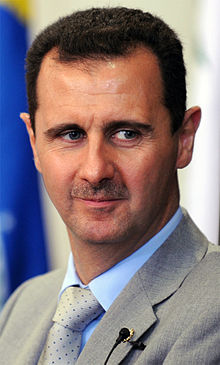
(The interview in this format and with these images was originally published by SANA on 21 Jan 2014, the day the before the scheduled Geneva 2 Peace talks. It has also been re-published on Global Research.) Editorial introduction: As noted before on candobetter on 11 June 2013, for a leader, whom even many ostensibly anti-war spokespersons insist is a corrupt and brutal dictator, Syrian President Bashar al-Assad has shown an astonishing willingness to be interviewed by critical and often hostile reporters. In not one interview have I seen President al-Assad fail to give informative and clearly truthful answers to all questions put to him (with the exception of those questions relating to military security and areas outside of his own direct reponsibility). Not only is President al-Assad acting upon the most laudable and humane motivations, he is also astonishingly intelligent, well-informed and quick-thinking as the interview below will show.
One of the few political leaders I can think of, who comes close to President al-Assad in these qualities, is the late United States President John F. Kennedy (JFK) who was murdered over 50 years ago for standing up to the same sorts of criminals that President al-Assad and the Syrian people are fighting today. It seems that President al-Assad and most supporters of Syria have not been made aware that the late JFK, as Senator in the 1950s and as President from January 1961, was an outspoken supporter of Arab nationalism, particularly that of the Algerian FLN. Were that to be made known, then possibly support for the Syrian people's fight against aggression could be made even broader still.
Jan 21, 2014
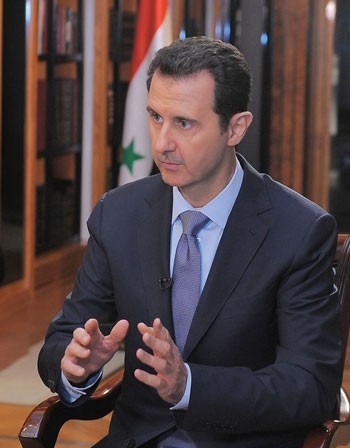
Damascus, (SANA)-President Bashar al-Assad gave an interview to Agence France Presse. Following is the full text of the interview:
AFP: Mr. President, what do you expect from the Geneva conference?
President Assad: The most basic element, which we continuously refer to, is that the Geneva Conference should produce clear results with regard to the fight against terrorism in Syria. In particular, it needs to put pressure on countries that are exporting terrorism, - by sending terrorists, money and weapons to terrorist organisations, - especially Saudi Arabia and Turkey, and of course the Western countries that provide political cover for these terrorist organisations. This is the most important decision or result that the Geneva Conference could produce. Any political solution that is reached without fighting terrorism has no value. There can be no political action when there is terrorism everywhere, not only in Syria but in neighbouring countries as well. From the political side, it is possible for Geneva to contribute to a process of dialogue between Syrians. There has to be a Syrian process within Syria and whilst Geneva could support this, it cannot be a substitute for it.
AFP: After nearly three years of devastating war and the big challenge of reconstruction in the country, is it likely that you will not be a candidate for the presidency?
President Assad: This depends on two things: It depends on personal aspirations or a personal decision, on the one hand, and on public opinion in Syria, on the other. As far as I am concerned, I see no reason why I shouldn't stand; as for Syrian public opinion, there is still around four months before the election date is announced. If in that time, there is public desire and a public opinion in favour of my candidacy, I will not hesitate for a second to run for election. In short, we can say that the chances for my candidacy are significant.
AFP: In these past years, have you thought for a moment about losing the battle, and have you thought of an alternative scenario for you and your family?
President Assad: In any battle, there is always the possibility of winning and losing; but when you're defending your country, it's obvious that the only choice is to win. Should Syria lose this battle that would mean the spread of chaos throughout the Middle East. This battle is not confined to Syria and is not, as Western propaganda portrays, a popular uprising against a regime suppressing its people and a revolution calling for democracy and freedom. These lies have now become clear to people. A popular revolution doesn't last for three years only to fail; moreover, a national revolution cannot have a foreign agenda. As for the scenarios that I have considered, of course these types of battles will have numerous scenarios – 1st, 2nd, 3rd……tenth, but they are all focused on defending the country not on running away from it. Fleeing is not an option in these circumstances. I must be at the forefront of those defending this country and this has been the case from day one.
AFP: Do you think you are winning this war?
President Assad: This war is not mine to win; it's our war as Syrians. I think this war has, if you will, two phases. The first phase, which took the form of plans drawn up at the beginning, was the overthrow of the Syrian state in a matter of weeks or months. Now, three years on, we can safely say that this has failed, and that the Syrian people have won. There were countries that not only wanted to overthrow the state, but that also wanted to partition the country into several ‘mini-states;' of course this phase failed, and hence the win for the Syrian people. The other phase of the battle is the fight against terrorism, which we are living on a daily basis. As you know, this phase isn't over yet, so we can't talk about having won before we eliminate the terrorists. What we can say is that we are making progress and moving forward. This doesn't mean that victory is near at hand; these kinds of battles are complicated, difficult and they need a lot of time. However, as I said, and I reiterate, we are making progress, but have not yet achieved a victory.
AFP: Returning to Geneva, do you support a call from the conference for all foreign fighters to leave Syria, including Hezbollah?
President Assad: Clearly the job of defending Syria is responsibility of the Syrian people, the Syrian institutions, and in particular the Syrian Army. So, there would be no reason for any non-Syrian fighters to get involved had there not been foreign fighters from dozens of countries attacking civilians and Hezbollah especially on the Syrian-Lebanese border. When we talk about fighters leaving Syria, this would need to be part of a larger package that would see all the foreign fighters leave, and for all armed men – including Syrians – to hand over their weapons to the Syrian state, which would consequently achieve stability. So naturally, yes, one element of the solution in Syria – I wouldn't say the objective – is for all non-Syrian fighters to leave Syria.
AFP: In addition to the prisoner exchange and a ceasefire in Aleppo, what initiatives are you ready to present at Geneva II?
President Assad: The Syrian initiative was put forward exactly a year ago, in January of last year. It's a complete initiative that covers both political and security aspects and other dimensions that would lead to stability. All of these details are part of the initiative that Syria previously put forward. However, any initiative, whether this one or any other, must be the result of a dialogue between Syrians. The essence of anything that is proposed, whether it's the crisis itself, fighting terrorism, or the future political vision and political system for Syria, requires the approval of Syrians. Our initiative was based on a process to facilitate this dialogue rather than a process to express the government's point of view. It has always been our view that any initiative must be collective and produced by both the political actors in Syria and the Syrian people in general.
AFP: The opposition that will participate in Geneva is divided and many factions on the ground don't believe it represents them. If an agreement is reached, how can it be implemented on the ground?
President Assad: This is the same question that we are asking as a government: when I negotiate, who am I negotiating with? There are expected to be many sides at Geneva, we don't know yet who will come, but there will be various parties, including the Syrian government. It is clear to everyone that some of the groups, which might attend the conference, didn't exist until very recently; in fact they were created during the crisis by foreign intelligence agencies whether in Qatar, Saudi Arabia, France, the United States or other countries. So when we sit down with these groups, we are in fact negotiating with those countries. So, is it logical that France should be a part of the Syrian solution? Or Qatar, or America, or Saudi Arabia, or Turkey? This doesn't make any sense. Therefore, when we negotiate with these parties, we're in fact negotiating with the countries that are behind them and that support terrorism in Syria. There are other opposition forces in Syria that have a national agenda; these are parties that we can negotiate with. On the issue of the vision for Syria's future, we are open for these parties to participate in governing the Syrian state, in the government and in other institutions. But as I mentioned earlier, anything that is agreed with any party, whether in Geneva or in Syria, must be subject to people's endorsement, through a referendum put to Syrian citizens.

AFP: In this context, could the ceasefire agreements that have been started in Moadimiya and Barzeh be an alternative to Geneva?
President Assad: The truth is that these initiatives may be more important than Geneva, because the majority of those fighting and carrying out terrorist operations on the ground have no political agenda. Some of them have become professional armed robbers, and others, as you know, are takfiri organisations fighting for an extremist Islamic emirate and things of that kind. Geneva means nothing for these groups. For this reason, the direct action and the models that have been achieved in Moadamiyeh, in Barzeh and other places in Syria has proven to be very effective. But this is separate from the political process, which is about the political future of Syria. These reconciliations have helped stability and have eased the bloodshed in Syria, both of which help pave the way for the political dialogue I mentioned earlier.
AFP: Are you prepared to have a prime minister from the opposition in a future government?
President Assad: That depends on who this opposition represents. When it represents a majority, let's say in parliament, naturally it should lead the government. But to appoint a prime minister from the opposition without having a majority doesn't make any political sense in any country in the world. In your country, for example, or in Britain or elsewhere, you can't have a prime minister from a parliamentary minority. This will all depend on the next elections, which we discussed in the Syrian initiative; they will reveal the real size of support for the various opposition forces. As to participation as a principle, we support it, of course it is a good thing.
AFP: Are you prepared to have, for example, Ahmed Jarba or Moaz Khatib, be your next prime minister?
President Assad: This takes us back to the previous question. Do any of these people represent the Syrian people, or even a portion of the Syrian people? Do they even represent themselves, or are they just representatives of the states that created them? This brings us back to what I mentioned earlier: every one of these groups represents the country that created them. The participation of each of these individuals means the participation of each of those states in the Syrian government! This is the first point. Second, let's assume that we agreed to the participation of these individuals in the government. Do you think that they would dare to come to Syria to take part in the government? Of course they wouldn't. Last year, they claimed that they had control of 70% of Syria, yet they didn't even dare to come to the areas that they had supposed control of. They did come to the border for a 30-minute photo opportunity and then they fled. How can they be ministers in the government? Can a foreigner become a Syrian minister? That's why these propositions are totally unrealistic, but they do make a good joke!
AFP: Mr. President, you said that it depends on the results of the elections, but how can you hold these kinds of elections if part of Syria's territory is in the hands of insurgents?
President Assad: During this crisis, and after the unrest started in Syria, we have conducted elections twice: the first was municipal elections and the second was parliamentary elections. Of course, the elections cannot be conducted in the same way they are conducted in normal circumstances, but the roads between Syrian regions are open, and people area able to move freely between different regions. Those who live in difficult areas can go to neighbouring areas and participate in the elections. There will be difficulties, but it is not an impossible process.
AFP: Now that opposition fighters are battling jihadists, do you see any difference between the two?
President Assad: The answer I would have given you at the beginning of the events or during its various phases, is completely different to the answer today. Today, there are no longer two opposition groups. We all know that during the past few months the extremist terrorist groups fighting in Syria have wiped out the last remaining positions that were held by the forces the West portrays as moderates, calling them the moderate or secular forces, or the Free Syrian Army. These forces no longer exist. We are now dealing with one extremist group made up of various factions. As to the fighters that used to belong to what the West calls ‘moderate forces,' these have mostly joined these extremist factions, either for fear or voluntarily through financial incentives. In short, regardless of the labels you read in the Western media, we are now fighting one extremist terrorist group comprising of various factions.
AFP: Would it be possible for the army and the opposition to fight against the jihadists side by side?
President Assad: We cooperate with any party that wants to join the army in fighting terrorists, and this has happened before. There are many militants who have left these organisations and joined the army to fight with it. So this is possible, but these are individual cases. This is not an alliance between ‘moderate' forces and the army against terrorists. That depiction is false and is an illusion that is used by the West only to justify its support for terrorism in Syria. It supports terrorism under the pretext that it is backing moderation against extremist terrorism, and that is both illogical and false.
AFP: The state accuses the rebels of using civilians as human shields in areas under their control, but when the army shells these areas, do you not think this kills innocent people?
President Assad: The army does not shell neighbourhoods. The army strikes areas where there are terrorists. In most cases, terrorists enter particular areas and force out the civilians. Why do you think we have so many displaced people? Most of the millions of displaced people in Syria have fled their homes because terrorists forcefully entered their neighbourhoods. If there are civilians among these armed groups, why do we have so many displaced people? The army is fighting armed terrorists, and in some cases, terrorists have used civilians as human shields. Civilian casualties are unfortunately the consequences of any war. There is no such thing as a clean war in which there are no innocent civilian victims. This is the unfortunate nature of war, and that is why the only solution is to put an end to it.
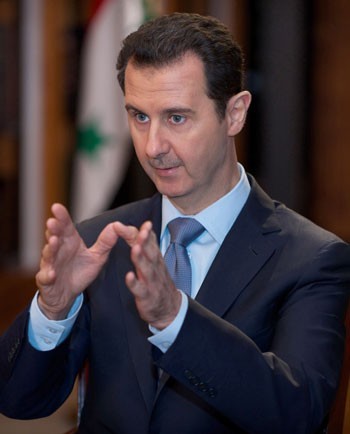
AFP: Mr. President, some international organisations have accused the government and the opposition of committing abuses. After this war ends, would you be ready for there to be an investigation into these abuses?
President Assad: There is no logic to this claim made by these organisations. How can the Syrian state be killing its own people, and yet it is still standing three year on, despite the fact that there are dozens of countries working against it. Had the Syrian state been killing its people, they would have revolted against it long ago. Such a state could not survive for more than few months; the fact that it has resisted for three years means that it has popular support. Such talk is more than illogical: it is unnatural. What these organizations are saying is either a reflection of their ignorance of the situation in Syria, or, in some cases, it shows they are following the political agenda of particular states. The Syrian state has always defended its civilians; it is well documented, through all the videos and the photos circulating, that it is the terrorists who are committing massacres and killing civilians everywhere. From the beginning of this crisis, up until today, these organizations do not have a single document to prove that the Syrian government has committed a massacre against civilians anywhere.
AFP: Mr. President, we know of foreign journalists who were kidnapped by the terrorist groups. Are there any foreign journalists in state prisons?
President Assad: It would be best for you to ask the relevant, specialised agencies on this issue. They would be able to give you an answer.
AFP: Would a reconciliation be possible, one day, between Syria on the one hand, and Saudi Arabia, Qatar and Turkey on the other?
President Assad: Politics changes constantly, but this change depends on two factors: principles and interests. We share no common principles with the states you mention; these states support terrorism and they have contributed to the bloodshed in Syria. As for interests, we need to ask ourselves: will the Syrian people agree to shared interests with these countries after everything that has happened and all the bloodshed in Syria? I don't want to answer on behalf of the Syrian people. If the people believe they share interests with these states, and if these states change their policy on supporting terrorism, it is plausible that the Syrian people might agree to restore relations. I can't individually as President, answer on behalf of all the Syrian people at such a time. This is a decision for the people.
AFP: Mr. President, you were welcomed on the occasion of July 14 (Bastille Day) in the Elysee Palace in Paris. Are you now surprised by France's position, and do you think France may one day play some kind of role in Syria?
President Assad: No, I am not surprised, because when that reception took place, it was during the period - 2008 to 2011 - where there was a attempt to contain Syria's role and Syria's policy. France was charged with this role by the United States when Sarkozy became president. There was an agreement between France and the Bush administration over this, since France is an old friend of the Arabs and of Syria and as such it is better suited to play the role. The requirement at that time was to use Syria against Iran and Hezbollah, and to pull it away from supporting resistance organisations in the region. This French policy failed, because its goal was blatantly obvious. Then the so-called Arab Spring began, and France turned against Syria after it had failed to honour the pledge it had made to the United States. This is the reason behind the French position during that period why it changed in 2011.
As for France's role in future, let's talk frankly. Ever since 2001 and the terrorist attacks on New York, there has been no European policy-making to speak of (and that's if we don't look back even further to the 1990s). In the West, there is only an American policy, which is implemented by some European countries. This has been the case on all the issues in our region in the past decade.
Today, we see the same thing: either European policy is formulated with American blessing, or American policy is adopted by the Europeans as their own. So, I don't believe that Europe, and particularly France, which used to lead the European policy in the past, is capable of playing any role in the future of Syria, or in neighbouring countries. There is another reason too, and that is that Western officials have lost their credibility. They no longer have double standards; they have triple and quadruple standards. They have all kinds of standards for every political situation. They have lost their credibility; they have sold their principles in return for interests, and therefore it is impossible to build a consistent policy with them. Tomorrow, they might do the exact opposite of what they are doing today. Because of this, I don't think that France will play a role in the immediate future, unless it changes its policy completely and from its core and returns to the politically independent state it once was.
AFP: How long do you think Syria needs to rid itself completely of its chemical weapons stockpiles?
President Assad: This depends on the extent to which the Organisation for the Prohibition of Chemical Weapons (OPCW) will provide Syria with the necessary equipment to carry out the process. So far, the process of making this equipment available has been quite slow. On the other hand, as you know dismantling and neutralizing the chemical materials is not taking place inside Syria nor by the Syrian state. A number of countries in different parts of the world have accepted to carry out that process; some have agreed to deal with the less dangerous materials, whilst others have refused completely. Since, the timeframe is dependent on these two factors - the role of the OPCW and the countries that accept to neutralize the materials on their territories – it is not for Syria to determine a timeframe on this issue. Syria has honoured its part by preparing and collecting data and providing access to inspectors who verified this data and inspected the chemical agents. The rest, as I said, is up to the other parties.
AFP: Mr. President, what has changed in your and your family's daily, personal lives? Do your children understand what has happened? Do you talk to them about this?
President Assad: There are a few things that haven't changed. I go to work as usual, and we live in the same house as before, and the children go to school; these things haven't changed. On the other hand, there are things which have affected every Syrian household, including mine: the sadness which lives with us every day - all the time, because of what we see and experience, because of the pain, because of the fallen victims everywhere and the destruction of the infrastructure and the economy. This has affected every family in Syria, including my own. There is no doubt that children are affected more deeply than adults in these circumstances. This generation will probably grow up too early and mature much faster as a result of the crisis. There are questions put to you by children about the causes of what's happening, that you don't usually deal with in normal circumstances. Why are there such evil people? Why are there victims? It's not easy to explain these things to children, but they remain persistent daily questions and a subject of discussion in every family, including my own.
AFP: Through these years, what was the most difficult situation you went through?
President Assad: It's not necessarily a particular situation but rather group of elements. There are several things that were hard to come to terms with, and they are still difficult. The first, I believe, is terrorism; the degree of savagery and inhumanity that the terrorists have reached reminds us of what happened in the Middle Ages in Europe over 500 years ago. In more recent modern times, it reminds us of the massacres perpetrated by the Ottomans against the Armenians when they killed a million and a half Armenians and half a million Orthodox Syriacs in Syria and in Turkish territory. The other aspect that is difficult to understand is the extent of Western officials' superficiality in their failure to understand what happened in this region, and their subsequent inability to have a vision for the present or for the future. They are always very late in realizing things, sometimes even after the situation has been overtaken by a new reality that is completely different. The third thing that is difficult to understand is the extent of influence of petrodollars in changing roles on the international arena. For instance, how Qatar was transformed from a marginal state to a powerful one, while France has become a proxy state implementing Qatari policies. This is also what we see happening now between France and Saudi Arabia. How can petrodollars make western officials, particularly in France, sell their principles and sell the principles of the French Revolution in return for a few billion dollars? These are only a few things, among others, which are difficult for one to understand and accept.
AFP: The trial of those accused of the assassination of former Lebanese Prime Minister Rafic Hariri has begun. Do you think it will be a fair trial?
President Assad: Nine years have passed since the beginning of this trial. Has justice been served? Every accusation was made for political reasons. Even in the past few days, we have not seen any tangible proof put forward against the parties involved in the case. The real question should be: why the timing? Why now? This court was set up nine years ago. Have the things produced in the last few days been uncovered only now? I believe that the whole thing is politicized and is intended to put pressure on Hezbollah in Lebanon in the same way that it aimed at putting pressure on Syria in the beginning, immediately after al-Hariri's assassination.
AFP: You have said the war will end when terrorism is eradicated. But the Syrians and everyone else want to know when this war will end. Within months? After a year? In years to come?
President Assad: We hope that the Geneva conference will be able to provide an answer to part of this by exercising pressure on these countries. This aspect has nothing to do with Syria; otherwise we would have put pressure on these states from the beginning and prevented terrorism from entering Syria. From our side, when this terrorism stops coming in, ending the war will not take more than a few months.
AFP: It appears Western intelligence agencies want to re-open channels of communication with Damascus, in order to ask you for help fighting terrorism. Are you ready for that?
President Assad: There have been meetings with several intelligence agencies from a number of countries. Our response has been that security cooperation cannot be separated from political cooperation, and political cooperation cannot be achieved while these states adopt anti-Syrian policies. This was our answer, brief and clear.
AFP: You have said in the past that the state has made mistakes. In your view, what were the mistakes that could have been avoided?
President Assad: I have said that mistakes can be made in any situation. I did not specify what those mistakes were because this cannot be done objectively until the crisis is behind us and we can assess our experience. Evaluating them whilst we are in the middle of the crisis will only yield limited results.
AFP: Mr. President, without Russia, China and Iran's help, would you have been able to resist in the face of the wars declared against you?
President Assad: This is a hypothetical question, which I cannot answer, because we haven't experienced the alternative. Reality has shown that Russian, Chinese and Iranian support has been important and has contributed to Syria's steadfastness. Without this support, things probably would have been much more difficult. How? It is difficult to draw a hypothetical picture at this stage.
AFP: After all that has happened, can you imagine another president rebuilding Syria?
President Assad: If this is what the Syrian people want, I don't have a problem with it. I am not the kind of person who clings to power. In any case, should the Syrian people not want me to be president, obviously there will be somebody else. I don't have a personal problem with this issue.
Thank you very much Mr. President.
Topic:
Attempt to stop Syria's voice being heard at the Geneva Peace Conference
European Union attempts to sabotage Geneva-2
by Thierry Meyssan (also included as Appendix).
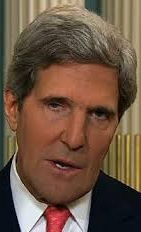
Approximately half a day before (2:30AM +10:0, 22 Jan 2013) the scheduled peace talks are to begin in Geneva, the plane carrying the Syrian delegation has been delayed at Athens Airport.
Russia Today reports:
"A plane with a Geneva 2 peace talks delegation onboard has been reportedly prevented from refueling as it landed in Athens."
"The plane en route to Switzerland was permitted to pass through the relevant airspace and had to land at Athens' airport for refueling, Reuters reported.
"Despite having proper clearances, the plane was still refused a refuel and the delay, so far, is three hours, according to SANA."
A Greek foreign Ministry spokesman claimed that "the issue has been settled. "Everything is OK, it has been cleared for take-off," he said, without specifying the reasons for the delay.
A Greek foreign Ministry spokesman claimed that "the issue has been settled. "Everything is OK, it has been cleared for take-off," he said, without specifying the reasons for the delay.
However, the Syrian Arab News Agency (SANA) reported:
Despite claims by the Greek Foreign Ministry that the situation was resolved, the plane is still at Athens International Airport and hasn't been allowed to refuel and thus cannot take off.
Speculated reasons for the delay, from local media reports include:
- "Ground crew refused the refuel because the pilots had not provided the airport with any flight plans or informed them of their intention to land there." – cited by ITAR-tASS
- "It could have been 'sanctions against the Assad regime.'"
Such explanations are simply not believable, given that a peaceful resolution of the Syrian conflict at Geneva conference, scheduled to start tomorrow, was at stake. That conflict has lasted nearly three years and has so far cost the lives of 100,000 Syrian citizens according to some estimates.
Almost certainly the real reason for the attempt to ground the Syrian delegation in Athens is a fear by Syria's enemies of the voices of members of Syria's delegation being heard by the people of the world. Given that:
- The evidence of the criminality of other participants at the Geneva, including United States Secretary of State John Kerry, on whose hands the blood of many Syrians lies, is overwhelming and conclusive; and
- The Syrian Government, particularly President Bashar al-Assad, has shown itself to be very effective at putting its case to the people of the world, through interviews with critical and often hostile journalists and through their media outlets such as the aforementioned SANA and Syria News,
... John Kerry and his allies will be seen for what they are by large numbers of people who are able to witness to the exchanges between them and the Syrian delegation.
Update: 2:40AM +10:00
A report by the Wall Street Journal only 15 minutes ago stated: "Syrian Delegation's Plane Grounded in Athens, Denied Fuel" but that has since changed to "Syrian Delegation's Plane Leaves Athens After Grounding Over Fuel". (Hopefully, the latter report proves to be correct.)
Appendix: European Union attempts to sabotage Geneva-2
The Geneva Peace Conference 2 had to take place, despite the obstacles strewn by the enemies of Syria.
UN Secretary General Ban Ki-moon, who had invited Iran Monday night withdrew his invitation Tuesday morning. Indeed, the delegation of the Syrian opposition had responded by canceling its attendance. To justify his retraction, Ban hypocritically evoked Iran’s refusal to endorse the Geneva I communique, which Iran can not do because it wasn't there.
Except for a last minute change, the delegation of the Syrian National Coalition should not include any member of its main component, the National Council. It should not include either any members of the Provisional Government in exile, whose Prime Minister has resigned.
The European Union is trying to delay the arrival of the Syrian delegation. Thus, France has denied the Syrian airplane fly over rights. Now, a small part of the Geneva International Airport is located on French territory. The plane should thus land near Montreux. On the other hand, Greece has refused to provide fuel to the Syrian plane which has been waiting for several hours on the tarmac in Athens. Although the Syrian delegation, whose composition has been known for a long time, is making the trip at the invitation of the UN Secretary-General, France and Greece-which are participating in the conference-argue that they are applying the sanctions of the European Union.
Stable Population Party leads field in Griffith By-Election 2014

|
The full Griffith field, in order of appearance on the ballot:
|
|
Young, plugged-in, family oriented
Timothy has strong interests in solving environmental and societal problems through systems thinking and stewardship of nature. He is keen to assist in raising public awareness of the sustainability equation, of which population is a crucial component. Recently married and looking to the future, Timothy is concerned about overdevelopment, housing affordability and cost of living for all citizens. He is 23 and encourages everyone to think "out of the box" to see the deeper solutions to global problems caused by unsustainable, exponential growth. Timothy, a software developer, is currently working as a games programmer and web designer in Taringa, Brisbane. He enjoys gardening and is an aspiring permaculturalist and cultivator-mycologist, while also being interested in philosophy, ethics, art and reading.
Would you like to help Timothy's campaign? contact the Stable Population Party
A weary uncritical mob of narrow focus
The other candidates in this election seem to be scraping to find anything to talk about, as they ignore the population elephant in the room. Indeed, they appear to be universally blinkered to the real problems of environment and population. This is bizarre since it was only recently that Queenslanders perished in massive floods due to persistent building on flood planes, mandated and encouraged by planners and politician, including Campbell Newman and Anna Bligh, who should have been tried for their responsibility in this. Brisbane itself was underwater for several hours.
6 reasons to stabilise Australia's population:
- Relieve overstretched infrastructure including hospitals, schools, roads and public transport
- Ease cost of living pressures including housing, energy, water and transport
- Protect our environment including food, water & energy resources, native bushland and animal habitats
- Promote education and training to increase job opportunities for all Australians
- Minimise overdevelopment including high-rise and sprawl
- Create a more resilient economy to sustain and enhance prosperity
Population is not a single issue, it is the everything issue.
National research confirms that over 70 percent of Australians reject the Liberal / National / Labor / Greens 'big Australia' policy outcome of around 40m (and rapidly rising) by 2050 . Yet until now we've had no choice. Powerful business lobby groups are pushing for this rapid population growth, in order to secure both cheap (including pre-trained) labour and more customers.
Keiser Report: How Bill Gates helped NSA snoops tamper with your computer and spy on you
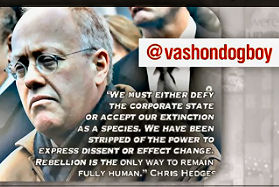
California Dreamin': Why I am running for State Treasurer
Welfare payments, health care for the poor, and benefits for the elderly and disabled have been slashed. State workers have been downsized. School districts in need of cash have been reduced to borrowing through "capital appreciation bonds" bearing 300% interest. In one notorious case, the Santa Ana school district actually borrowed at 1,000% interest. And the governor acknowledges that California still faces a "wall of debt" amounting to $28 billion. Some analysts put it much higher than that. At the end of the 20th century, California was ranked the sixth largest economy in the world. By 2012, it had slipped to number twelve. It is coming back up, in part because European countries are falling further into recession; but California's poverty rate remains the highest in the country. More than eight million Californians struggle to meet their daily needs, and one in four children lives in poverty. Income inequality is higher in the nation's most populous state than in almost any other. California cannot solve its budget problems by slashing services that have already been cut to the bone or raising sales taxes that hurt the poor far more than the rich. We are fighting over a pie that remains too small. The pie itself needs to be expanded — and it can be. How? By reclaiming that portion that is now siphoned off in interest and bank fees. When tallied up at every stage of production, interest has been calculated to claim one-third of everything we buy. The approach was pioneered in North Dakota, the only state to escape the 2008 banking crisis. North Dakota has the lowest unemployment rate in the country, the lowest foreclosure rate, the lowest default rate on credit card debt, and no state debt at all. It is also the only state to own its own bank. In the fall of 2011, a bill for a feasibility study for a state-owned bank passed both houses of the California legislature. The Public Banking Institute, which I founded and chair, was instrumental in helping to get the bill as far as it got. But it died when Jerry Brown vetoed it. His rationale was that we already have a banking committee, and that the matter could be explored in-house. Needless to say, however, we have heard no more about it since. I am therefore running for California State Treasurer on a state bank platform, along with Laura Wells, who is running for Controller. We are throwing our bonnets in the ring for the opportunity to show the Governor or his successor that a state-owned bank can be our ticket to returning California to the abundance it once enjoyed. I was a recipient of that abundance myself. I got my undergraduate degree at UC Berkeley in the 1960s, when tuition was free; and my law degree at UCLA Law School in the 1970s, when tuition was $700 a year. Today it is $13,000 and $45,000 annually, respectively, for in-state students. In the 1960s, the governor of California was Jerry Brown's father Pat Brown, a New Deal visionary who believed that investment in education, infrastructure and local business was an investment in the future. Our goal is to revive that optimistic vision in 2014. We are running on the endorsement of the Green Party — along with Luis Rodriguez for governor and David Curtis for secretary of state — because Green Party candidates take no corporate money. Candidates who take corporate money — and that means nearly all conventional candidates — are beholden to large corporate interests and cannot properly represent the interests of the disenfranchised 99%. California's revenues are currently parked in those very largest of corporations, Wall Street banks. These out-of-state banks use our giant asset pool for their own speculative purposes, and the funds are at risk of confiscation in the event of a "bail-in." In North Dakota, by contrast, all of the state's revenues are deposited by law in the state-owned Bank of North Dakota (BND). The BND is set up as a DBA of the state ("North Dakota doing business as the Bank of North Dakota"), which means all of the state's capital is technically the bank's capital. The bank uses its copious capital and deposit pool to generate credit for local purposes. The BND is a major money-maker for the state, returning a sizable dividend annually to the treasury. Every year since the 2008 banking crisis, it has reported a return on investment of between 17 percent and 26 percent. The BND also provides what is essentially interest-free credit for state projects, since the state owns the bank and gets the interest back. The BND partners with local banks rather than competing with them, strengthening their capital and deposit bases and allowing them to keep loans on their books rather than having to sell them off to investors. This practice allowed North Dakota to avoid the subprime crisis that destroyed the housing market in other states. Consider the awesome potential for California, with its massive capital and deposit bases. California has over $200 billion stashed in a variety of funds identified in its 2012 Comprehensive Annual Financial Report (CAFR), including $58 billion managed by the Treasurer in a Pooled Money Investment Account currently earning a meager 0.264% annually. It also has over $400 billion in its pension funds (CalPERS and CalSTRS). California's population of 37 million is more than 50 times that of North Dakota.1 In 2010, the BND had about $4,500 in deposits and $4,200 in loans per capita. Multiplying 37 million by $4,200, a State Bank of California could, in theory, generate $155.4 billion in credit for the state; and this credit would effectively be interest-free free, since the state would own the bank. What could California do with $155 billion in interest-free credit? One possibility would be to refinance its ominous "wall of debt" at 0%. A debt that is interest-free can be rolled over indefinitely without cost to the taxpayers. Another possibility would be to fund public projects interest-free. Eliminating interest has been shown to reduce the cost of public projects by 35% or more. Take, for example, the San Francisco Bay Bridge earthquake retrofitting boondoggle, which was originally slated to cost about $6 billion. Interest and bank fees wound up adding another $6 billion to the overall cost to taxpayers. Funding through its own bank could have saved the state $6 billion or 50% on this project. Then there is the state's bullet train fiasco, which has been beset with delays, cost overruns, and funding issues. As with the Bay Bridge, costs are projected to double as a result of compounding interest on long-term bonds, imposing huge hidden costs on the next generation of taxpayers. By funding the bullet train through a state-owned bank, its costs, too, could be reduced by 50%. As voters become increasingly disillusioned with big-corporate-money candidates, the third party option is gaining traction. According to a recent Gallup poll, in 2013 42% of Americans identified themselves as political independents, significantly outpacing Democrats at 31% and Republicans at 25%. The growing threat posed by independent and third-party candidates may explain why it is getting harder and harder to run as one. In California we now have Proposition 14, the Top Two primary, sometimes called the "Louisiana primary" or "jungle primary." It might better be named the Incumbents' Benevolent Protection Act. Proposition 14 requires statewide and congressional California candidates, regardless of party preference, to participate in a nonpartisan blanket primary, with only the top two candidates advancing to the general election. Incumbents and heavily-funded candidates have historically reaped the benefits of this arrangement. Third party candidates are liable to get knocked out in the first round in June, eliminating them from the November elections. But the new system does have the advantage that anyone can vote for any candidate in the June primary; so if we can mobilize voters, we have a shot. There is, however, another new hurdle imposed by Proposition 14. In place of the 150 signatures-in-lieu-of-filing-fee needed earlier, we now need 10,000 signatures — either that or $2,800. But we're hoping to turn that requirement, too, to advantage, by using it to build the people power and energy necessary to take the June 3, 2014 primary. If you would like to sign a petition or donate, click here. There is another way to balance a state budget, one that leads to prosperity rather than austerity. California can stimulate its economy and the job market, restore low-cost higher education, build 21st-century infrastructure, preserve the environment, and relieve the state's debt burden, by establishing a bank that is owned by the people and returns its profits to the people.
How can that money be recaptured? By owning the bank.
The North Dakota Model: Banking that Supports Rather Than Exploits the Local Economy
The Challenge of a "Jungle Primary"
Footnote[s]
We Need a People's Constitution and We Need it Now!

I am leveling the following charge against our Australian constitutional system: Everyday Australians must follow the rules, but they cannot change them. Australians have no real say over their own system of government, at either state or federal level.
If this accusation is correct the implication is that Australians are not free, they are subjects of the Elite.
Do we need to change our Constitution? Considering that it is over a century old and not a Constitution for the ‘people’, Matthew Mitchell, in this post says “yes, we certainly do”.
I am leveling the following charge against our Australian constitutional system:
Everyday Australians must follow the rules, but they cannot change them. Australians have no real say over their own system of government, at either state or federal level.
If this accusation is correct the implication is that Australians are not free, they are subjects of the Elite.
The obvious reply is that we have the ability to have referendums. Do we really? Even if a large number of citizens wanted a significant change what is the likelihood that change would occur? I claim it is zero. Referendums must first be approved by our parliament, thus any proposal is not put directly to the people, it is first filtered and modified, and likely rejected, by our parliamentary political system. The system preserves itself, and is immune to change proposals. The only ideas that even get close to referendum are proposals that entrench the status quo (eg: replacing the titular head of state); increase or preserve the powers of one or another levels of government (eg: recognition of local government), and even if well intentioned may be undermined (eg: constitutional changes proposed as part of the republic) or seen as coming from a
favoured political group. Thus it is no wonder that referendums usually fail, Australians are perhaps quite rightly innately un-trusting of any proposal that is put to referendum, suspecting that it serves one or another vested interest.
Thus Australians are not free – they have no say over what their political system is, or how it works. They are stuck with a system set up by colonial masters and elite citizens over 100 years ago. This system can only be changed with the consent of those privileged few that control the parliament (those who Govern us, the subjects) and it is highly unlikely – impossible even – that proposals from anyone who is not a member of the political or business elite will get attended to.
It does not have to be this way! In Switzerland the People are truly sovereign – they can force a referendum on any issue they choose, if they get 100,000 signatures. And they do it regularly. Sometimes more than 12 times a year! Relevant examples include:
A referendum on Immigration Quotas (to be held in February this year)
Urban sprawl, spatial planning and development
It is claimed that this ability to change the constitution makes Switzerland a more stable country compared to countries like Australia whose constitutions are now well out of date. The fact is that Australia’s Constitution (at state and federal levels) is an undeniable mess, as Peter Olney discusses below (take for example, the ridiculous invention of a Queen of Australia).
Restore our constitution, local councils are not governments
If we are going to move to a republic, which really is a concept most Australian’s would support (if they trust the changes), then why not fix the whole constitution and perhaps introduce Swiss style direct democracy at the same time?
There was a vote to federate years ago (which was not that inclusive) but really there was no choice (for the people) of what constitution they may have. Thus no vote on this, as there were no choices! In any case, if we have at least one proposal that gives us some choice: the old or the new?
However, in this day and age, people trust grass roots movements more than proposals coming from the seats of power, or what are seen as the seats of power. Thus GetUp! campaigns have more legitimacy than government proposals for referendums on local government or anything else. So a new constitution is more likely to be trusted, and voted in, if it seen to come from the people: a People’s Constitution.
And the truth is that there are already several proposals that could form the basis of new People’s Constitution:
United People Power, John Skene, Restore Australia and no doubt others also.
And perhaps this new constitution could include Indigenous people like never before and help correct some long standing injustices, such as Indigenous rights and recognition. There are also proposals to this effect such as one by UNILEX and another on Change.org.
But let us beware that in this process, there is a serious danger. It is likely that as discussion of proposals for a new constitution progresses, long brewing issues and injustices will also be highlighted. Make no mistake, there are issues that need to be discussed. They include not only Indigenous rights and recognition but also real or perceived threats to Australian values and culture from immigration and some minority groups (such as associated with the RestoreAustralia proposal).
But we must be very CAREFUL that we do not vilify immigrants who have come here under our past legal framework in good faith. If anything, or anyone, is to blame for our current situation and predicaments – it is our legal framework that may not allow sufficient democratic say on important national issues and the generations of politicians, lawyers and bureaucrats that have allowed this undemocratic system to continue for so long. In this regard I suggest we also look at Professor George William’s writing on the need for constitutional change as well as Justice Cheryl Saunders' speech on the need for a Bill or Rights.
However, there is a degree of urgency in this if we are to address pressing issues, such as growth, immigration and trade (such as signing away of our sovereignty with the TPP pact) whilst there is still time. But please let us do this with care, consideration and compassion for all who do, or may, call Australia home. Let Australians set an example of how societies can move forward peacefully – there has already been too much violence in the development of new nations like Australia and America. Time for a change!
[Ten News Sydney] Racist attack on Sydney Bus - 2/4/2013
(David Donovan and Peter Olney are acknowledged for their contribution to this article).
Syrian singer al-Hinawi supports Syrian Army's fight against terrorism

She added that she rejected the offer based on her national stances which oppose any intervention in Syria's sovereignty, moreover, the program presenter is well known for her negative stance towards the crisis in Syria.
Al-Hinawi reiterated her confidence in President Bashar al-Assad and the Syrian army's members who are confronting terrorism in Syria.
Other stories recently published by SANA (See also Syria News)
Egypt - by Kelvin Thomson
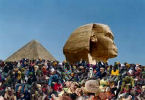
(Headings added by candobetter.net editor.)
1994 Cairo Conference failed Egypt
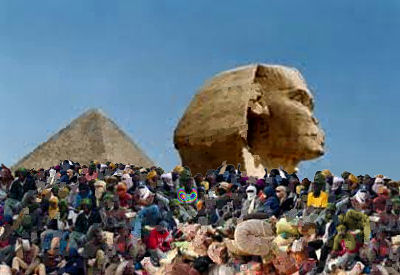 Ironically one of the countries which has suffered most from the failure of the Cairo Conference was Egypt itself. In 1948 Egypt’s population was less than 20 million. It added a further 20 million by 1975, and another 20 million by 1994, the time of the Conference, and another 20 million to reach 80 million by 2011. The UN says that continuing high fertility rates would see Egypt reach 100 million by 2025 and 140 million by 2050.
Ironically one of the countries which has suffered most from the failure of the Cairo Conference was Egypt itself. In 1948 Egypt’s population was less than 20 million. It added a further 20 million by 1975, and another 20 million by 1994, the time of the Conference, and another 20 million to reach 80 million by 2011. The UN says that continuing high fertility rates would see Egypt reach 100 million by 2025 and 140 million by 2050.
Egypt's birth rate reality exceeds UN projections
In fact Egypt’s birth rate for the last three years exceeds the UN’s “high” projections. The number of births in the 1990s was 1.6 million on average. This increased to around 1.8 million births in the first decade of this century. There were 2.4 million births in 2011 and 2.6 million in 2012, according to the Central Agency for Public Mobilisation and Statistics. Back in 1950 Egypt had the same number of births as Italy. By 1977 it had the same number as Italy and France combined. By 2000 it matched the combined total of Italy, France and Spain, and by 2012 the combined total of Italy, France, Spain and the United Kingdom.
Hypocrisy of religious and other leaders on population matters
The consequences of this rapid population growth are plain for all to see – violent, debilitating conflict over access to scarce resources. The world’s leaders need to tell Egypt’s leaders that they need to stop focussing on today’s battles for just long enough to draw attention to the underlying problem, and the need to reduce their birth rate to more traditional levels. If they do not, it is entirely predictable that there will be more conflict and misery in future, not less. It is entirely predictable that many people will seek to escape the conflict and misery, ending up in boats headed for islands in the Mediterranean and other destinations. It is also predictable that religious leaders will urge the world to be compassionate and welcoming – religious leaders from the same religious organisations that worked hard at the Cairo Conference in 1994 to scuttle and undermine attempts to stop rapid population growth.
Post comment to candobetter here and or to Kelvin Thomson MP for Wills, Victoria, himself here: Kelvin Thomson's blog
Shame Indonesia: Surabaya Zoo hell on earth for animals
 If justice prevailed for these poor creatures, the people responsible would be placed in a dark dungeon forever to atone for allowing this to happen. The specimen letter inside this article responds to reports of the death of scores of animals in the Surabaya Zoo, Indonesia, and seeks the immediate closure of the zoo, immediate medical attention to be provided by trained veterinarians to all animals on site, and transfer of all enclosed animals to accredited facilities.
If justice prevailed for these poor creatures, the people responsible would be placed in a dark dungeon forever to atone for allowing this to happen. The specimen letter inside this article responds to reports of the death of scores of animals in the Surabaya Zoo, Indonesia, and seeks the immediate closure of the zoo, immediate medical attention to be provided by trained veterinarians to all animals on site, and transfer of all enclosed animals to accredited facilities.
Consul-General Teguh Wardoyo
Consulate of Indonesia in Hong Kong
6-8 Keswick Street
Causeway Bay
Hong Kong
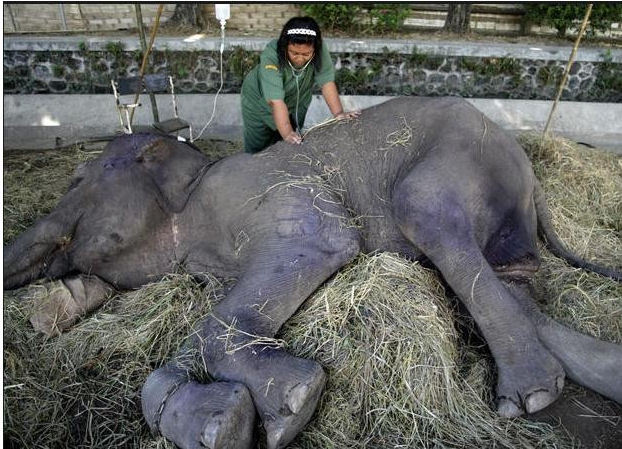
Indonesian Economic and Trade Office to Taipei
Mr. Ahmad Syafri
6F, No. 550 Rui Guang Road
Neihu District
Taipei, Taiwan, 114
Taipei Economic and Trade Office in Jakarta
Mr. Andrew Li-Yan Hsia
Gedung Artha Graha, Lt. 17 Jl. Jend. Sudirman Kav. 52-53 Jakarta 12190, Indonesia

Dear Sir, Madam, to whom it concerns:
I am writing to seek your support for the following:
-The immediate closure of Indonesia's Surabaya Zoo
-Immediate medical attention to be provided by trained veterinarians to all animals on site
-Transfer of all enclosed animals to accredited facilities
The news that has come out of Surabaya Zoo about the death of scores of animals is extremely disheartening to say the least.
Endangered animals such as Sumatran Tigers and Bornean Orangutan dying prematurely due to preventable illnesses and a lack of veterinarian care, emaciated camels, shackled elephants with wounds on their ankles, unable to take one step in any direction and the death of a giraffe due to the 20KG of plastic bags found in his stomach are only a few of the horrific problems that have been found at Surabaya Zoo.
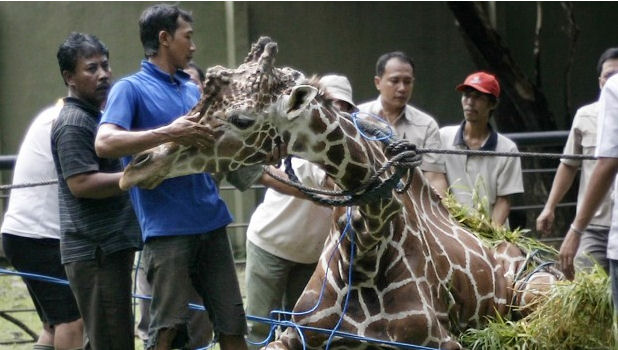
None of the 5 Freedoms of Animal Welfare ( Freedom from thirst and hunger, Freedom from discomfort, Freedom from pain, injury, and disease, Freedom to express normal behavior, Freedom from fear and distress) are being met, which is a basic requirement that all zoos must provide.
Thanks to the reporting of international media outlets such as The L.A Times, The Huffington Post, The Age Environment, The Jakarta Globe and the UK Telegraph the international community is now aware of the horrific conditions animals suffer in at Surabaya Zoo. More than 200,000 people from around the globe have already signed petitions demanding the closure of the zoo.
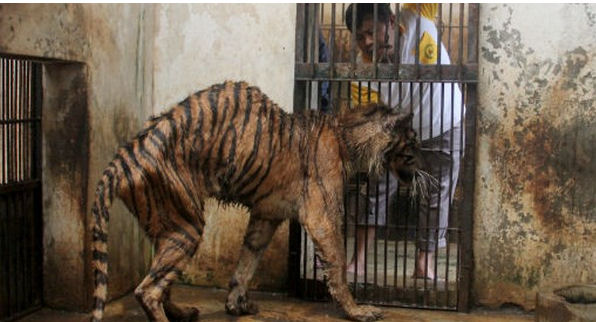
To tackle the issues of neglect and suffering imposed upon the animals at Surabaya Zoo, I implore you to take immediate action to have the zoo closed and to have qualified veterinarians provide all affected animals with the medical care they so desperately require.

Now is the time for the government of Indonesia to show the world and, in particular, the people of Indonesia, young and old, that a new day has dawned and that the 5 Freedoms of Animal Welfare will not only be honoured, but mandated in government policy and all those who do not comply will be dealt with by law.
Indonesians deserve to be proud of their government’s stance on animal welfare. I, as a potential visitor to your country, would most definitely support tourism to Indonesia if it's animals are protected.
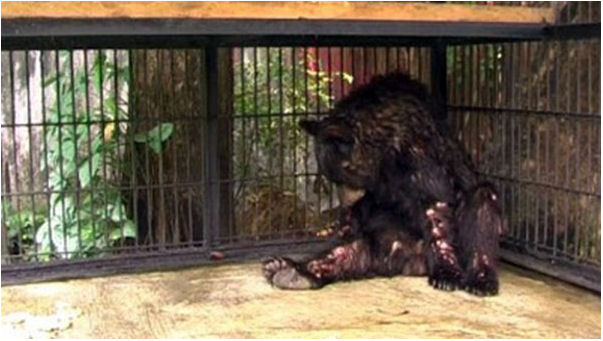
http://www.youtube.com/watch?v=LzoDmIlogFo
http://www.youtube.com/watch?v=LSXw34GSUgo
http://www.youtube.com/watch?v=QKrRsN7iMsA
Sincerely yours,
[Place your signature here]
Sheep will suffer and die from heat : live export industry
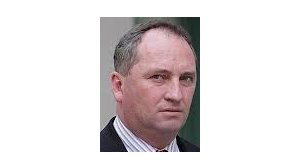
My email to Minister of Agriculture: The Hon. Mr Barnaby Joyce, Jan 14th, 2014
Dear Hon. Mr Barnaby Joyce, Minister for Agriculture
A vet has voiced fears for any sheep being transported and held on live export ships at Fremantle Port as the mercury heads for potential record levels.
Temperatures have nudged 50 degrees near Onslow and Exmouth at the end of last week with a mass of warm air heating over the Pilbara. While you might be safely in air conditioned offices, there are sentient creatures who won't be so comfortable. Perth is warned to brace for extreme temperatures on the weekend as hot air from the Pilbara sweeps down over the city.
Livestock Shipping Services (LSS) vessel the Bader III is currently docked at Fremantle Port, but its export manager Paul Keenam said on Friday he did not know when the ship was due to leave port or if sheep would be transported by road on Saturday. The sheep won't be able to control their body temperatures, and suffer heat stress.

Vets against Live Animal Exports spokeswoman Heather Cambridge said she had studied heat stress in animals in detail and that if there was a ship holding animals in port, heatwave conditions could prove fatal. Dr Cambridge said animals at most risk were those loaded on a ship, but animals on the lower levels of trucks would also be in danger of suffering heat stress.
North Queensland Land Register: Fears for export sheep in heatwave
Animals shipped live from Australia can be confined on vessels for up to three weeks – that is 504 consecutive hours. High temperatures and poor ventilation can contribute to fatal heat stroke in cattle, particularly in those breeds whose physiology is ill-suited to hot climates. Sheep have shown a clear aversion to ammonia from their waste, and tests have shown that it adversely affects the welfare of steers.
The Cormo Express left Fremantle (Western Australia) for Jeddah (Saudi Arabia) carrying 57,937 sheep in 2003. Built in 1979 as a ‘roll-on-roll-off’ ferry, the Cormo Express had been converted to an 11-deck animal transporter in 1989. En route to Jeddah, 1.1% of the cargo (637 sheep) died. On arrival in the heat of Jeddah on 21st August, the shipment was rejected by Saudi authorities who claimed 6% of the animals suffered from ‘scabby mouth’. After almost 11 weeks at sea in extreme temperatures and humidity, one in ten, some 5,692 animals had died, mostly from heat stress and exhaustion while simply waiting in ports to be unloaded.

(Photo the property of liveexportshame.com)
21,000 Australian sheep sent to Pakistan have been killed en masse in the most brutal way. Workers stabbed and clubbed the harmless sheep and even buried them alive in the same pits dug for the dead sheep. This happened after weeks stuck on a ship in sweltering heat ... and then being confined in mud-filled pits with hardly any access to water and food and barely enough room to lie down.
One can only imagine the suffering these animals have endured while slowly dying due to illness, starvation,trampling or heat stress. The vast majority die in their crowded pens without any aid or treatment.
Despite efforts made by both the Australian Government and the live export industry to regulate the export process, tens of thousands of animals continue to die every year while being exported. (and they're said to be the "lucky ones"!)
Our government is under heavy pressure from wealthy and very effective lobby groups, like the live export industry. It's based on cruel monetary gain and selfish profits. It's devoid of compassion and ethics and is a shameful for Australia. Why not listen to the vets? These animals will suffer and die! There are more values in society than simply $$$$.
Email for Minister Barnaby Joyce: [email protected]
Extraordinary call for increase to migrant Worker Program by Australian Industry Group
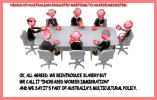 "It is astonishing that the Australian Industry Group [AIA] is calling for an increase in Australian migration from 190,000 to 220,000, through an increase to our permanent Migrant Worker Program. First it is astonishing that they think the number should be lifted by 30,000, when as recently as twenty years ago the entire permanent Migrant Worker Program was less than 30,000. Secondly it is astonishing that they want to increase the number of migrant workers when we are already unable to find jobs for Australian workers" (Kelvin Thomson, MP., Wills, Victoria, Australia)
"It is astonishing that the Australian Industry Group [AIA] is calling for an increase in Australian migration from 190,000 to 220,000, through an increase to our permanent Migrant Worker Program. First it is astonishing that they think the number should be lifted by 30,000, when as recently as twenty years ago the entire permanent Migrant Worker Program was less than 30,000. Secondly it is astonishing that they want to increase the number of migrant workers when we are already unable to find jobs for Australian workers" (Kelvin Thomson, MP., Wills, Victoria, Australia)
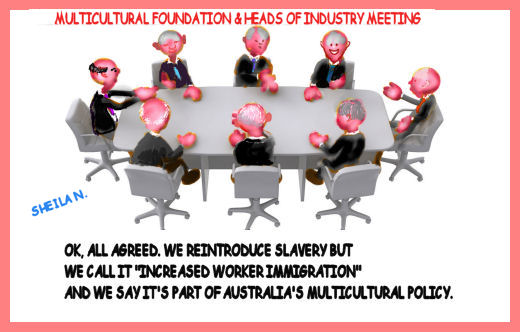 [Headings and emphasis are by candobetter.net editor]
[Headings and emphasis are by candobetter.net editor]
Why would industry call to increase worker immigration when Australians cannot get jobs?
Secondly it is astonishing that they want to increase the number of migrant workers when we are already unable to find jobs for Australian workers, including those who have come here on previous permanent Migrant Worker Programs. Last month unemployment increased by 3,400 to 712,500 Australians who cannot find work, and this number is forecast to increase. Official forecasts are that the jobless rate will rise within about 18 months to 6.25%, and stay there through to the end of 2016-17. More Australians will be out of work than at any time during the past decade, and far more than during the Global Financial Crisis. The forthcoming closures of Ford and Holden, job losses at Qantas, concerns for jobs at SPC Ardmona and Alcoa, the resources industry construction workforce winding back – all the indicators are that many Australians, including migrant workers, are looking for work or will be looking for work in the near future. They are entitled to our first consideration.
AIA irresponsibly and selfishly misrepresenting Oz population growth rate
The Australian Industry Group says that increasing migrant numbers is needed to “support positive growth in our population”, and refers to relatively low levels of natural population growth. This is incorrect. For each of the past thirty-six years I have gone back to check this, births have exceeded deaths in Australia by over 100,000 – we have natural population increase by over 100,000 every year without any migration at all. In any event, population growth is not a good thing. It is putting great pressure on our environment, quality of life, housing affordability, traffic congestion etc.
Need to use Australian's skills
The permanent Migrant Worker Program, referred to as “Skilled Migration”, should be used to bring workers with skills that it is not possible to find in Australia, not used as a catch all scheme – recently we even saw calls to bring in truck drivers from overseas. It should not be used to drive population growth, not used to put downward pressure on wages and conditions, and not used as a substitute for genuine action to train and skill young Australians. If we are fair dinkum about reducing unemployment, and fair dinkum about increasing workforce participation, we will reduce migrant worker programs, not increase them, and build and use the skills of out-of-work Australians.
- Please feel encouraged to post your comments on candobetter.net and also on Kelvin's Blog: http://kelvinthomson.blogspot.com.au/2014/01/extraordinary-call-for-increase-to.html
East West Link Tunnel threat to Melbourne Zoo
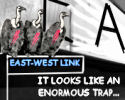 "If Oregon can shut down highway construction adjacent to its zoo for four months over concern with the health of one pregnant elephant, what are the ongoing risks to the animals at Melbourne Zoo? These are amongst the questions that need answers before any contract is awarded." Michael Petit
"If Oregon can shut down highway construction adjacent to its zoo for four months over concern with the health of one pregnant elephant, what are the ongoing risks to the animals at Melbourne Zoo? These are amongst the questions that need answers before any contract is awarded." Michael Petit
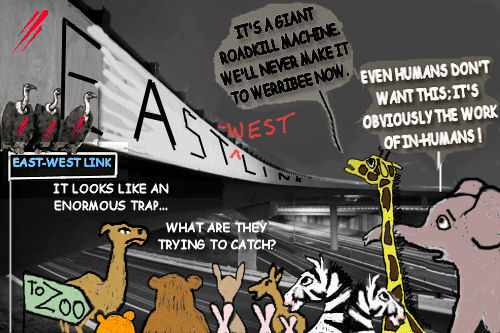
Detailed study required of zoo animal health risk re East-West Link tunnel
Candobetter.net has been forwarded an important communication written by Michael Petit on "the need to get the Melbourne Zoo or State Government to commission a detailed study on the serious health risks to vulnerable animals at the Melbourne Zoo prior to the signing of a contract for the East West Toll Road and Tunnel." [Headings added by candobetter.net editor]
Mr Petit writes:
"An examination of the Linking Melbourne Authority (LMA) Comprehensive Impact Statement (CIS), video and media comments makes it clear that any detailed examination of the noise, vibration and lighting from the Toll Road and Tunnel that comes within 100 metres of the Melbourne Zoo will not occur until after the contract is signed. This would be a huge mistake.
Throughout LMA's documents and statements it reveals no detail whatsoever on anticipated levels of noise and vibration but simply says that the project will (quote) "meet international standards."
However, the noise levels sanctioned by VicRoads for new major toll roads including the East West Toll Tunnel are at levels that according to two Reports from the World Health Organization sanction levels that cause adverse health effects on people and by reasonable extension to vulnerable zoo animals. Tolerable noise levels are critical at night when species such as elephants and rhinos that will be within 100 to 150 metres of the project and, like people, need a good night's sleep.
However, VicRoads permits noise levels of 63 dB(A) for new toll roads and 68 dB(A) for old ones so its multiple claims in its Comprehensive Impact Statement documents that they 'meet international standards' is simply not the case."
Australian noise standards very lax compared to international ones
Mr Petit continues:
The World Health Organization comparable standard for Europe is 55 dB(A) as is the 55 dB(A) set by the New South Wales road authority including works on the Northern Pacific Highway. It is an even a lower 45 dB(A) for applicable road works in Hong Kong. These are the real international standards.
Oregon Zoo no comparison: Melbourne plans infinitely worse
[... T]he State Government is fond to cite the tunnel under the Oregon Zoo as an argument for its East West project. But there are some very significant differences.
The tunnel was 79 metres below the surface in Oregon but will emerge or start at ground level and burrow 30 or 40 metres underground directly outside the Melbourne Zoo. It was already at 79 metres depth when it passed under the Oregon Zoo. Also, the elephant area at the Oregon Zoo is between 200 and 300 metres from the major Sunset Highway US 26 compared to 100 to 150 metres in Melbourne. More than twice the distance in depth and distance. And, in Oregon, the Department of Transportation suspended works on US 26 for four months to avoid any risk of miscarriage for one of the elephants at Oregon Zoo.
Why isn't Melbourne Zoo asking more questions?
"We should therefore not only be concerned with vibration and noise during construction but on an ongoing basis as thousands of trucks from Port Melbourne stream through the tunnel hour after hour, day after day. This raises a number of interesting questions such as whether there are animals that may have to be relocated during and/or after construction and why is the Zoo not asking more questions! And, as the gestation period for elephants is 22 months, are there any pregnant elephants at Melbourne Zoo or likely to be over the next five years proposed for construction of this toll road and tunnel project?
If Oregon can shut down highway construction adjacent to its zoo for four months over concern with the health of one pregnant elephant, what are the ongoing risks to the animals at Melbourne Zoo? Will some have to be relocated?
These are amongst the questions that need answers before any contract is awarded.
Former US Attorney General: US (& Australian) sanctions against Iraq are genocidal
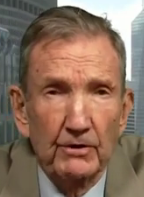
Footnote[s]
Parallel computing expertise needlessly scrapped by ANU Computer Science department
 On May 18, 2010 I was severely brain-injured in a collision which occurred when I was cycling to my job as a Patient Support Officer (cleaner) at the Royal Brisbane and Women's Hospital. This was the tragic end to my absence from my real career choice and qualifications in computer science, forced on me because of misinformation given to me by my last employers in that field. At the time of the accident I was seriously attempting to return to my career, having learned, to my utter disgust, that the project from which I was sacked after two years, which I was told was a complete failure, had not failed at all. I may have forgotten a lot due to my brain injury, but I have not forgotten this. The injustice is seared in my memory and I am now publishing the documents that record the truth of my pre-injury predicament. They may also help others in this cut-throat industry. This will be the first in a number of contemplated articles on my experience of brain injury. Sheila Newman has also written a book about it which will probably be published late this year or the next.
On May 18, 2010 I was severely brain-injured in a collision which occurred when I was cycling to my job as a Patient Support Officer (cleaner) at the Royal Brisbane and Women's Hospital. This was the tragic end to my absence from my real career choice and qualifications in computer science, forced on me because of misinformation given to me by my last employers in that field. At the time of the accident I was seriously attempting to return to my career, having learned, to my utter disgust, that the project from which I was sacked after two years, which I was told was a complete failure, had not failed at all. I may have forgotten a lot due to my brain injury, but I have not forgotten this. The injustice is seared in my memory and I am now publishing the documents that record the truth of my pre-injury predicament. They may also help others in this cut-throat industry. This will be the first in a number of contemplated articles on my experience of brain injury. Sheila Newman has also written a book about it which will probably be published late this year or the next.
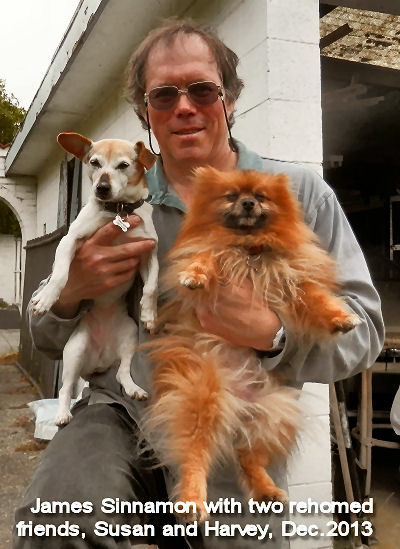
How a computer scientist became a hospital cleaner and then a hospital patient
I was overqualified for the role of cleaner because I had an Honours Degree in Computer Science from the University of Southern Queensland and had worked for two years to implement the Distributed Java Virtual Machine in the Computer Science Faculty of the Australian National University (ANU) running parallel on more than 80 computers. (Much of the content of the ANU page that describes the details of this project is missing as of 10 January 2014. The error message states: "Fatal error: Call to undefined function: mysql_select_db() in /data0/web/data/feit/functions/connect.php3 on line 14"). At the end of two years on the ANU project, my supervisors claimed that my work on this was substandard and I was forced to accept that judgment at the time.
I have since learned that my work must have been of a very high standard, because, only 3 months after I finished at the ANU, a Canadian Masters student commenced to use the DJVM as a platform on which to build her Masters degree software project. Had there been the slightest bug, let alone any serious flaw in the DJVM, it would have been much harder, if not impossible for her to complete the project. However not knowing that, I saw no alternative but to seek low skilled work. That is why I ended up working as a cleaner. And that is how I came to suffer a severe brain injury.
Thanks to my RBWH supervisor, Jan Dring, for her kindness
Although my position as a cleaner at the Royal Brisbane and Women's hospital was not what I had studied to do, to be fair to the RB&WH, working conditions at the time were good. My supervisor, Janine Dring, now retired or retrenched, encouraged me to apply for clerical work. She was also the person who identified me when I was brought unconscious to Accident and Emergency after the collision. I have been told that she visited me on the ward and one evening, while I was still unable to form memories, she obtained permission and then took me down to spend time with my work colleagues. I spent over two months in the Neurosurgery ward in Brisbane and then a further six weeks in Mater Private, before coming down to Melbourne because my carer was advised that rehabilitation and services were better there than in Queensland.
Below is a letter that I sent to my former supervisor in 2008, when I realised how misled I had been about my abilities.
Complaint to Dr John Zigman of my treatment by ANU Computer Science staff 2002-2004
Subject: Complaint of my treatment by ANU Computer Science staff 2002-2004
Date: Mon, 8 Dec 2008 16:56:53 +1000
From: James Sinnamon
[Email sent to: Dr John Zigman, Dr Steven Blackburn, Peter Strazdins, Dr Ramesh Sankaranarayana.]Dear Dr John Zigman,
This is just to let you know:
I have not worked in my chosen vocation of computer science since my involvement in the Distributed Java Virtual Machine Project (http://djvm.anu.edu.au) abruptly ended in February 2004.
When I last spoke to you, as I recall, in May 2004, and asked if you reconsider your decision to not offer me a PhD scholarship to work on the continuation of the DJVM project in Arc Project DP0449670, I at least gained the impression that you would do anything you would have been practicably able to to help me out of my dire professional circumstances.
I would never have dreamed that you would have failed to take the small amount of effort that would have been entailed in passing on to me knowledge that would have almost certainly have allowed me to confidently approach prospective IT employers for work.
That knowledge was that the DJVM I had helped to implement had been chosen by a Canadian student (http://webhome.csc.uvic.ca/~jbaldwin/) as a platform on which to build her Masters project (http://aosd.net/workshops/late/2006/later/submissions/baldwin.pdf) and that the DJVM had met all of her requirements.
I have been judged for not having more vigorously sought employment since February 2004, but I wonder if those people making those judgements could understand the effect of having the hard work of two years of my life deemed, implicitly or explicitly, as worthless, by every one of those I had worked closely with during that time.
I formed the distinct impression from you that the DJVM I had tested on 72 nodes, packaged and documented was to be shelved in favour of another DJVM to be built using BCEL and it was not until years later that I was to learn that my DJVM had, indeed, been used, after all, on ARC project DP0449670.
If, after working late into the night every night often for weeks on end facing heartbreaking bug after heartbreaking bug (never as far as I recollect having been introduced by myself), I could not produce a product of worth to anyone else, then what possible chance did I stand of being able to produce anything of value to any employer by working normal hours?
As a consequence, I have not been able, for the last four and a half years, to even bring myself to write my resume, let alone a job application. Every attempt I have made to do so has only driven me into despair and depression.
The simple knowledge that the DJVM I had helped to implement had been successfully put to use would have changed everything for me. How that could not have occurred to you is beyond me.
I can only come up with three conceivable reasons why you would have withheld that knowledge from me:
1. That my fate and well-being mattered so little to you that it never again entered your head again after I last spoke to you around May 2004
2. Malicious intent.3. Acknowledgement of my contribution to the DJVM project would have somehow been an embarrassment to you and would have threatened your own reputation.
4. Some combination of the above.
Instead, as a result, I am working today as a cleaner without any realistic prospects of even being able to gain employment in a white collar occupation let alone in IT.
When I went to Canberra in early 2002 I had hoped, if nothing else, to get from my employment simple unambiguous achievement that I could subsequently use to impress prospective employers.
I badly needed a crowning achievement in my CV because, prior to that, my IT career had been very patchy, I would argue, largely for reasons beyond my control.
As it turned out my implementation was indeed exactly that, but neither you nor anyone else bothered to tell me and I was until April 2008 over four years later that I was to learn this.
Because I was not told this, it looked to me, and to any prospective employer, like shelfware which, for all anyone knew, may not have even worked at all.
As I had been denied the chance to actually use the application I had poured my heart and soul into for two years I had no way of knowing if it would have met the requirements of any other user and prospective employers would have only had my word to go on that it had been meticulously tested on up to 72 nodes using novel debugging techniques I had devised myself.
If I had not worked so hard to do that, on occasions against your own counsel, it is most likely that it would have not met the requirements for the Masters Project to implement Aspect Orientation.
Even if it was true that I was seriously wanting as a prospective PhD student as you, Dr Peter Strazdins, Dr Steven Blackburn, Dr Ramesh Sankaranarayana all implied, then, surely, at least I was entitled to some honest feedback well before October 2003, less than two months before my contract was originally due to expire?
In fact, I distinctly recall being told by you only a matter of days before the news was broken to me that I was not to be part of the DJVM project that you considered me an indispensable part of the DJVM team, but that all changed, apparently after the others told you they didn't think I was up to it.
I was subsequently told in January 2004 that only after that did you bother to think more deeply about my performance and come to arrive at the conclusion that I had, indeed, demonstrated my unsuitability months before that as a result of my own contribution to the ARC research grant application having been judged unsatisfactory and as a result of the way I had worked on the first version of the DJVM in 2002.
Whatever the validity or otherwise of those claimed concerns about me, to have not, at some more timely stage, made the effort to have sorted out in your own mind their implications for my own future with the DJVM project and make them known to me, I consider a gross failure in your duty of care to me as my supervisor.
From all the evidence I can see on the DJVM web site, little has been achieved in well over four years since I was unceremoniously dumped from the project.
In fact, given the seeming lack of progress, it seems to me highly probable that you, Dr Peter Strazdins, Dr Ramesh Sankaranarayana and Dr Steven Blackburn have been hasty and wrong in your judgement of me, made behind my back in 2003.
Perhaps now it may be acknowledged that the supposedly excessive time I spent was, indeed, what was necessary to solve the problems I was faced with.
Wherever the truth lies, I was entitled to much more timely feedback so that either I could have been given the opportunity to lift my game or, if that was not possible, to have begun to make realistic preparations for an alternative subsequent career.
In Dr Peter Strazdins' case, it has since become clear to me that he had decided well before the outcome of the ARC research grant applications were known that I was to be dumped from the project but had never made the effort to inform me. To the contrary, he even asked me to participate in the 24 hour pushbike race that was to be shortly held. I took this to be confirmation that he expected me to remain at the ANU. How anyone would imagine that someone, whose career prospects were as grim as he must have known mine to be, would have wanted to spend weeks training for such a physically gruelling event is beyond me.
On the day that the outcome of the ARC research grant applications were announced in October 2003, you burst into the office to break to me the good news that our application had been successful. That naturally led me to believe that I was to be included on the project and that you wished me to be included on the project.
I asked all present including, as I recall, Dr Steven Blackburn, Dr Peter Strazdins and yourself that a meeting be held ASAP so that we could discuss the future of the DJVM project. no-one else bothered to tell me that I was not to be included. In fact, almost a whole week went by before Dr Peter Strazdins bothered to break the news to me and, even then, it was only after I had gone into his office and had raised the issue.
These are only some of the reasons that I consider your overall treatment of me to be inexcusable. It is hard for me to conceive of a more shabby way for any professional to have been treated by former work colleagues, let alone by colleagues I had considered to be friends.
I intend to make a formal complaint of this through whatever channels are still available to me.
Whilst it is not clear if you can be held to account for what you did as you apparently no longer work for the ANU, I also hold Dr Peter Strazdins, Dr Ramesh Sankaranarayana and Dr Steven Blackburn culpable for what happened to me.
Regardless of what my prospects are and regardless of the eventual outcome, I intend to put this on the public record so that others may be warned not to place their trust in you.
Yours sincerely,
James Sinnamon [...]
Red Hill QLD 4059
Documents indicating DJVM project was successful after all
Below I reproduce two emails recording my correspondence with Jennifer Baldwin, the Canadian student who used the virtual java machine that I successfully produced.
Subject: Re: Distributed Java Virtual Machine and AJVM
Date: Fri, 25 Apr 2008
From: Jennifer Baldwin
To: james.sinnamon [...]Hi James,
No worries about the delay in replying, takes me awhile as well. But
you never did call me 'Janet'> So am I right to assume that you encountered no serious bugs in the dJVM?
That's right, we never did find any bugs that weren't introduced by my own
code.> Do you mean http://djvm.anu.edu.au/download/DJVM-1.1.0.tar.gz
Yes, that's the one. I haven't really looked at it other than noticing
it no longer has patch files so I couldn't use it for the type of
research I was doing anyways.Jennifer
-------------------------------------------------------Subject: Distributed Java Virtual Machine and AJVM
Date: Fri, 11 Apr 2008
From: James Sinnamon
To: [Jennifer Baldwin]Dear Jennifer Baldwin,
I worked as a research programmer on the dJVM for two years from 2002 until
March 2004.I was gratified to learn that the DJVM had been put to use since my
involvement ended. I have just cursorily viewed your documents and found
the dJVM within http://webhome.cs.uvic.ca/~jbaldwin/AJVM.tar.gzCan I ask how difficult or easy it was to get the dJVM built and then used?
Whilst I had tested it on up to 72 nodes with, as I recall, relatively trivial
Java applications it failed to run a considerably more complex multi-threaded
Java application I had written for an Honours Year project in 2001.Interfaces were never dealt with as it seemed to me as if no further
modifications to the RVM were required, but when my applicaiton crashed, I
speculated as to whether this because modifications were necessary for
Interfaces. I wasn't able to pursue this.Yours sincerely,
James Sinnamon
A cut-throat industry
Given the extremely high rates of unemployment in the Information Technology/Computer Science industry and the lack of industrial protection in that field in Australia, my story must echo the experiences of many computer professionals. Perhaps few will have had their misfortune amplified to the degree that mine was, but my awful experience still serves to highlight the downstream impact that casual arrogance in employers and supervisors in any field may ultimately produce. Surely in a world less characterised by the anonymity of globalisation and constant people movement, and so-called efficiency, it would be much harder for human beings to treat each other so badly, without actually declaring war.
Towards maintaining credentials in the computer industry, I built the political and environmental internet site candobetter.org (which later became candobetter.net). After my injury I was no longer able to maintain the site, but Sheila Newman, my major collaborator on candobetter.net, has gone out of her way to salvage and oversee its management. For me, this was tremendously important. Without that site I would possibly have little connection with my former activities in the social and political sphere.
Portrait of a beautiful young female kangaroo
 Sad Update: "I am so sorry but I have some terrible news. I have just found Potsei dead at 6.30 am, she has been hit by a car. Potsei had a very immature dead joey in her pouch." Two days ago the news was that Potsei, in the photo, "now has many boyfriends who love to keep watch over her. She is such a beauty."
Sad Update: "I am so sorry but I have some terrible news. I have just found Potsei dead at 6.30 am, she has been hit by a car. Potsei had a very immature dead joey in her pouch." Two days ago the news was that Potsei, in the photo, "now has many boyfriends who love to keep watch over her. She is such a beauty."
Two days ago, this was the "Breaking News:.....Not 100% sure but there could be a joey on the way, which by my calculations, might pop its head out around August..... watch this space!"


Rebuilding friendship with possums in Brisbane's urban rainforest

Disconnected
Three and a half years ago, on 18 May 2010, I was cycling to work my afternoon shift as a hospital cleaner at the Royal Brisbane and Women's Hospital 3 kilometres north of the Brisbane CBD. (How I went from computer scientist to hospital cleaner is another story which you can read here.) At the entrance to a sports field, I was almost killed when a 4-wheel-drive ran into me.
I have no recollection of the accident itself. I only recall the cycle ride up to a few seconds before it. As a result of my head's impact with the 4-wheel-drive, I was knocked unconscious. Whilst, in general I am opposed to laws which compel every cyclist to wear a helmet, almost certainly, my bicycle helmet saved my life on that day. Still, I was seriously injured and suffered diffuse axonal brain damage.
Python devours possum
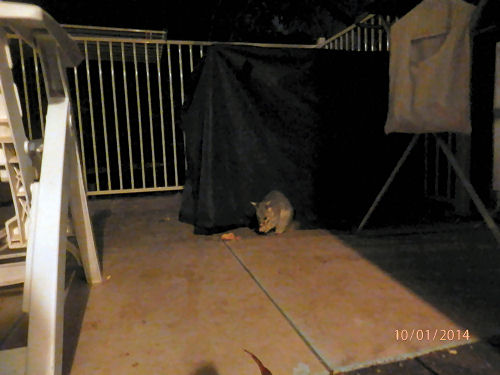
As a result of this damage my ability to recall events has suffered. My father, Ian Sinnamon, tells me that, not long before my injury, I witnessed a python devouring a poor little possum (like those in the included images) beneath his house. I would have thought that is the sort of experience that very few people would forget., yet I have absolutely no recollection of the incident. Many other memories of my past life have also been lost. Whilst some have returned to me in the past three and a half years, I fear many others will not.
Most fortunately, I was not disfigured and, friends tell me, I have not lost my intellect. Most people who meet me in the street would not know that I am disabled.
As a result of my diffuse axonal brain damage, I am less coordinated and have less physical balance than before. My mental stamina has been reduced. The brain injury initially left me hemiplegic. I had to relearn how to walk, and the long-term effect has diminished my physical stamina and physical strength.
Three and a half years later, I have recovered to some degree, thanks to the care and support given to me by family and friends and most of all, Sheila Newman, my principle collaborator on candobetter since 2006.
I have spent much of the time since my injury in Victoria undergoing various kinds of rehabilitation. I spent nine months as a day patient at VicRehab's Glen Waverley premises. Sheila Newman, her parents, other friends, doctors, psychologists and other health professionals have also helped my recovery.
Various friends and acquaintances have lived in my Brisbane premises in the intervening period as house-minders and tenants. Sadly, not all have liked the local possums as much as I did.
Sheila and I are currently visiting my Brisbane premises. Whilst our present tenant is not hostile to the possums and has been feeding them carrots, he does not feel quite as much love for them as I do. Over the past 4 days I have tried to rebuild my relationships with the possums by leaving them pieces of banana, mango (donated by a local resident from his mango tree), and even the occasional piece of cake. Below are photos of my encounter with the possums last night. As I type this at 8:21PM (+10:00) on 11 January 2014, at least one of the possums is devouring pieces of banana on the balcony outside the door behind me.
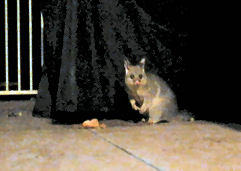
Welcome to Big Australia dystopia - why some people want it
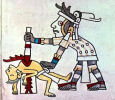
Article by Sheila Newman and James Sinnamon.
Absence of choice hallmark of Big Population
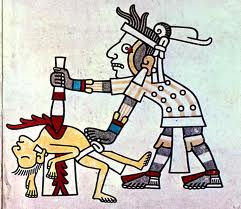
The tone is dictatorial: You will have a Big Australia. It will be perhaps 48.3m in 45 years. Nowhere in the article is anyone saying who decided to allow such high immigration or questioning the events leading up to this - certainly not the current Australians or those of 20 to 40 years ago. It is as if the author, who is the Melbourne Bureau Chief for the Australian Financial Review knows about some change afoot that the rest of us don't suspect; perhaps something violent that will stop dead any revolt as more and more Australians realise what they are being herded towards.
Aztec-like traditions
Aztec-like, the article harbingers the elites' desired crammed Australia with a symbolic child sacrifice, Alexander Marshall of Malvern East. As with the best traditional victims, Alexander, who looks about 5 years old, has no say in his fate. Innocence is what the gods and the elites require. Alex's appearance as a star on the elite-media altar that is the Australian Financial Review will be all too brief. Soon, through the aging process, he will look different from his photograph here. If the elites who drive the big financial markets and Australia's distant governments have their way, Alexander will gradually fade into an ever growing crowd of Australians suffering shortages of vital resources and competing with a stream of foreign born students and workers who will, by that time, have completely overwhelmed Alex's contemporaries. With immigration 60 per cent of Australia's population growth now and if the anticipated population of 48.3 (or more) actually happens, most of those people will be a foreign born selection-weighted for their ability to out-compete the natives in housing, income, position and status.
The infill process
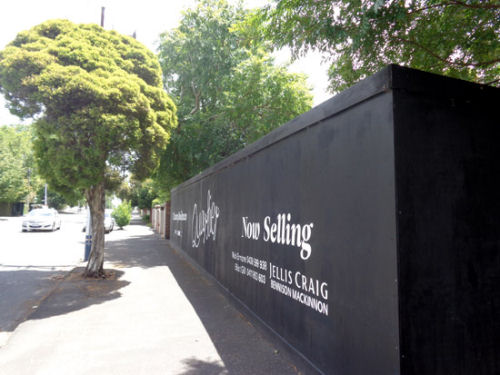
Alex's suburb, Malvern East, will be unrecognisable, well before he reaches fifty, for Malvern East is doomed by planners to 'high densification', part of the plan to cram in that 48.3m and the next 48.3m and the ones after those. This old suburb, with its spacious and ornate wooden houses (all that is left of once vast forests nearby), its broad-leafed plane trees on every street, is already pocked with moonscaped sites and notices announcing twelve new units for a single block.
Scapegoating the elderly
The article pretends, "That people can expect to live longer than any other period in history is a main driver of this population increase." In reality it is out-of-proportion mass immigration that is clearly driving Australia's overpopulation. Ironically, that immigration, far from keeping the population youthful, is actually increasing the rate of aging. The article uses the old fallacy that we need many migrants to care for our hugely aging population, without ever admitting - does the writer even realise? that past immigration contributes more aged to our population than the native-born? See "Immigration speeds up Australia's rate of aging - FECCA" and High post-war immigration blamed for today's economic problems.
For a completely different way to manage the needs of our population and economy, see: "Discussing Australia's Dependency ratio 2009 with graph by Dr Katharine Betts".
Scapegoating outer-suburbanites and the disabled
Another hallmark of this typically growthist article is its scapegoating of certain classes. Scapegoats include those who live at a distance from the CBD away from major transport routes. They are portrayed as costing the rest of us for infrastructure, however elsewhere, the article acknowledges that population growth is driving housing unaffordability and thus pushing people outwards to cheaper lots. (High density inner suburbs also need lots of infrastructure - consider the proposed and already hated East-West Link. High-rise use more fuel to run than houses.) The aged, of course, are accused of being the reason that we must all submit to our 'demographic destiny'.
The AFR beats the ageist drum, beginning the article by evoking how a tram has to wait while a 70 year old man with a prosthetic leg slowly mounts it. "Getting drivers to wait for passengers to reach their seats is just one example of the changes we will have to make in the way we live and work if we are to cope with the massive population changes experts predict." The problems with this image and its conclusion are multiple. Firstly, people have long lived to 70 plus and had prosthetic limbs. (Remember Long John Silver?). Secondly, we are in a society that promotes independence for the disabled. Thirdly, and much more relevantly, has the author not noticed that women with prams and toddlers usually also cannot mount moving trams at a run. This is an example of the absurd lengths to which journalists, high and low, are expected to go to market the growthist message in Australia. They might as well be writing for real-estate agencies, but in fact they are. Both the Fairfax and Murdoch press are heavily invested in global marketing of Australian real-estate among their many other corporate interests. More and more of the pages of the Australian Financial Review these days are taken up with real-estate, property development, land-marketing, land-use planning arguments, and industries associated with immigration. This article by Dunckley is just one more example, a double-pager one, signifying that someone there thinks they have to step up the pace of propaganda.
Live AFR videos: Rebecca Thistleston tells of measures the Building Industry advocates the government adopt for a sufficient number of houses to cope with population growth to be built; Matt Starkey describes our future with more than double (48 million) our current population (23 million) by 2061 and 70 million by 2100.
Demographic mythology of the Growth Lobby
I have been reading articles like this one in the Australian press since the early 1990s, when I began to understand what was driving Australia's population growth in the face of manifest democratic disquiet. See The Growth Lobby in Australia and its Absence in France, which first identified what it is about our system and other Anglophone systems that makes it so hard to stop population growth when elites are driving it. For a short explanation of what the "Growth Lobby" is, see "How the growth lobby threatens Australia's future". I recently wrote a book, the result of ten years of independent work on population and economic theories, (S.M. Newman, Demography Territory and Law: The Rules of Animal and Human populations, Countershock Press, 2013.) I honestly know quite a lot about population and I can tell you that this article is a compendium of demographic mythology, thrown together to prop up a failing economy in the short-term, and throwing the rest of us to the wolves. The scale of population growth that this article is advocating is nothing short of an invasion.
Why it all makes sense
My attention was first drawn to Mathew Dunckley's article in the Financial Review by a number of people who are concerned about the consequences of overpopulation in Australia. A frequent remark was that it did not make economic sense to advocate a situation where democracy would be frankly reduced by crowding of electorates and an increasing number of people would face malnutrition, homelessness and disease. Why would anyone advocate such a situation? The answer seems to be that this situation benefits a few corporations and their investors. The banks want it, the property developers want it, the miners and building materials producers want it, and the newspapers want it. They want it because there is global economic decline and they have important investments in resources and commodities that benefit from increased demand. They know that increasing demand by driving up population growth will cause poverty and social dysfunction. But they don't care. Unlike the Australian, the Age, the Herald Sun, the Sydney Morning Herald or the Courier Mail etc., which all have the same agenda , the Australian Financial Review does not even pretend to care about 'democracy' or the 'people'.
Tourism vs Big Business - an example of the paradigm
Many people in Australia are worried about the effect of human population growth and infrastructure expansion on Australian wildlife and habitat. They often seek economic arguments to defend other creatures and the beauty of nature against people and forces that appear completely uninterested in anything but money. So these conservationists wonder why, for instance, koalas are being driven extinct through the rapid removal of their remaining patchy habitat. Why, they wonder, would the government damage local tourist industries by removing the very things that attract so many people to this country? This conundrum arises repeatedly. Indeed the native animal and wild spaces tourism is a huge and valuable source of income for many people in Australia, and particularly for those in rural areas. So, why would government policy be so much more inclined to destroy than to protect it? The answer is obvious to anyone except those who still believe that Australia's governments try to promote what is best for most Australians. Our governments are only interested in what is good for banks, property developers, and allied corporations. Our elites and their parliamentary servants have become quite distant from nature and reality. They have no feeling for their compatriots, only for their financial and political peers. They are not interested in local economies; they are probably against local self-sufficiency, cooperation and self-government. So, the senseless makes sense, in a way, if you are blinded by greed.
Protected Habitat Doubles for Magnificent and Endangered Blue-throated Macaw
 (Washington, D.C., January 2, 2014) Bolivia’s Barba Azul Nature Reserve, home to the world’s largest population of the majestic Blue-throated Macaw, has been doubled in size through efforts led by Asociación Armonía, Bolivian partner of American Bird Conservancy (ABC). Asociación Armonía and several partner groups worked together to purchase an additional 14,820 acres that have expanded Barba Azul Nature Reserve from 12,350 acres to 27,180 acres. The reserve is the only protected savanna in Bolivia’s Beni bioregion that is spared cattle grazing and yearly burning for agricultural purposes.
(Washington, D.C., January 2, 2014) Bolivia’s Barba Azul Nature Reserve, home to the world’s largest population of the majestic Blue-throated Macaw, has been doubled in size through efforts led by Asociación Armonía, Bolivian partner of American Bird Conservancy (ABC). Asociación Armonía and several partner groups worked together to purchase an additional 14,820 acres that have expanded Barba Azul Nature Reserve from 12,350 acres to 27,180 acres. The reserve is the only protected savanna in Bolivia’s Beni bioregion that is spared cattle grazing and yearly burning for agricultural purposes.
"Blue beard"
“Barba Azul” means “Blue Beard” in Spanish and is the local name for the Blue-throated Macaw, which only occurs in Bolivia and is listed as Critically Endangered by the IUCN (International Union for the Conservation of Nature). It was also recently listed under the U.S. Endangered Species Act. The Barba Azul Nature Reserve is the world’s only protected area for the Blue-throated Macaw; the reserve has hosted the largest known concentration of these birds, with close to 100 recorded on the reserve at times. (More on these critically endangered and historically sought after large, intelligent, long-lived social parrots)
International wildlife conservation effort
“Conservation actions of this magnitude for small organizations in poor countries are only possible with outside help. Doubling the size of the Barba Azul Nature Reserve is an excellent example of conservation groups combining their effort to achieve a massive conservation product,” said Bennett Hennessey, Executive Director of Asociación Armonía.
Several organizations and individuals teamed up to achieve this historic conservation result: American Bird Conservancy, Patricia and David Davidson, International Conservation Fund of Canada, IUCN NL / SPN (sponsored by the Netherlands Postcode Lottery), Loro Parque Fundación, Rainforest Trust, U.S. Fish & Wildlife Service’s Neotropical Migratory Bird Conservation Act Grants Program, Robert Wilson Charitable Trust, and World Land Trust.
Forests, grasslands, and wetlands are all protected thanks to the new lands (see photo) acquired to extend the Barba Azul Nature Reserve. The extension of Barba Azul includes two large palm forest islands, an essential foraging area for the Critically Endangered Blue-throated Macaw, as well as a forest home for many arboreal mammals and birds. Photo by B. Hennessey, Asociación Armonía.
The reserve extension protects broad grassy plains of the Beni savanna that are seasonally flooded in the rainy season. Also included in the newly protected area are a small river as well as “islands” of tropical forest characterized by tropical hardwoods and palms in this sea of grass. Two large forested islands provide crucial foraging habitat for Blue-throated Macaws, while more than 20 small forested islands provide roosting and potential nesting sites for these birds.
“The small forested islands appear to be great sites to use artificial nest boxes to attract Blue-throated Macaws to breed here,” Hennessey added. Armonía is currently working at the reserve to attract Blue-throated Macaws to artificial nest boxes, with support from ABC, Bird Endowment, Loro Parque Fundación, and the Mohamed bin Zayed Species Conservation Fund.
Reserve supports about 250 more bird species
In addition to the macaw, the Barba Azul Nature Reserve supports roughly 250 species of birds. The tall grasslands provide habitat for the Cock-tailed Tyrant and Black-masked Finch, both listed as Vulnerable by IUCN, as well as healthy populations of the Greater Rhea (Near Threatened) and migratory Bobolink from North America. Extensive wetlands attract flocks of waterbirds, including the Orinoco Goose (Near Threatened), which use nest boxes on the reserve. Armonía staff observed more than 1,000 Buff-breasted Sandpipers on the reserve in 2012, making Barba Azul the most important stop-over site for this species in Bolivia. The reserve extension will protect five additional miles of short-grass river shore habitat used by Buff-breasted Sandpipers during their spring migration.
The Barba Azul extension protects more than 20 small isolated forest islands (including those shown above) which are preferred nesting and roosting sites for the Blue-throated Macaw. Photo by B. Hennessey, Asociación Armonía.
Also a haven for exotic mammals
Barba Azul is also a haven for mammals, thanks to the reserve’s protection of the Omi River, which is the only year-round source of water for miles around and a critical dry-season resource. The extension of Barba Azul improves its ability to protect the 27 species of medium and large mammals that depend on this habitat, including giant anteater (Vulnerable), pampas cat, puma, marsh deer (Vulnerable), pampas deer, white-collared peccary, and capybara. The reserve extension is critically important to maintain large protected areas for species needing expansive territories, like the maned wolf and jaguar.
The Beni savanna is an area twice the size of Portugal. It is a land of extreme contrasts, with intensive flooding in the summer and months of drought in the winter. Almost entirely occupied by private cattle ranches, these savannas have undergone hundreds of years of logging, hunting, and cattle ranching. Overgrazing, annual burning to promote new grass growth for cattle, and the planting of exotic grass species have greatly altered this ecosystem, which is now considered critically endangered.
Blue-throated Macaws fly free over the Barba Azul Nature Reserve. Photograph by D. Lebbin, ABC.Great result from exclusion of cattle, hunting, fishing logging of forest habitat
Frequent burning, overgrazing, and timber harvests within forest patches degrade habitat for Blue-throated Macaws and may limit the number and suitability of nesting sites. At Barba Azul, exclusion of cattle is already resulting in the restoration of forest understories, and artificial nest boxes offer hope that Blue-throated Macaws will have more opportunities to breed.
“When we originally purchased the Barba Azul Nature Reserve, it was a habitat that held high abundance of many animals. But once we removed cattle and stopped hunting, net fishing, logging, and uncontrolled grassland burning, the true destructive impact of an overgrazed, poorly controlled ranch could be seen. Everything is rebounding as if the area is recovering from a drought,” said Hennessey.
Macaw populations infamously affected by pet-trade and habitat destruction
The Blue-throated Macaw population has declined due to habitat degradation and trafficking for the pet trade. In addition to establishing the reserve, Armonía has worked with local communities in the Beni region to raise awareness of this species and effectively halt illegal trade in this macaw. Additionally, Armonía has provided local communities with beautiful synthetic feather head-dresses for use in traditional festivals as a conservation-friendly alternative to feathers gathered from wild macaws.
Birdwatchers flock to this haven
Barba Azul is a great place for birdwatchers, wildlife photographers, and researchers, who come from around the world to study birds and mammals based out of the research center on site. Armonía will be building additional cabins for tourists over the coming year. If you are interested in visiting the reserve, please contact BirdBolivia or find more information at ConservationBirding.org. More information about ABC and Armonía’s efforts to conserve the Blue-throated Macaw and Beni savannas is available on their websites.
NOTES
Original source of this article was http://www.abcbirds.org/newsandreports/releases/140102.html
American Bird Conservancy (ABC) is a 501(c)(3) not-for-profit membership organization whose mission is to conserve native birds and their habitats throughout the Americas. ABC acts by safeguarding the rarest species, conserving and restoring habitats, and reducing threats, while building capacity in the bird conservation movement. We are proud to be a consistent recipient of Charity Navigator’s four-star rating.
Asociación Armonía is a non-profit organization dedicated to the conservation of birds and their natural habitat in Bolivia. Armonía’s conservation actions are based on scientific studies and active involvement of local communities, respecting their culture and knowledge. Asociación Armonía is the Bolivian key partner of American Bird Conservancy, BirdLife International, Loro Parque Fundación, Rainforest Trust, and World Land Trust.
Rainforest Trust is a 501(c)(3) not-for-profit organization whose mission is to purchase and protect threatened tropical forests and save endangered wildlife through community engagement and local partnerships. For 25 years, Rainforest Trust has saved over 7 million acres of critical habitat across the tropics and consistently receives Charity Navigator’s top four-star rating.
A review of ABC Vote Compass results: Do they demonstrate the ABC's pro population growth bias?

 The ABC has done a great job documenting its Vote Compass Project. However the results highlight the role of the ABC in setting the election issue agenda, despite the fact that the ABC explains: "Vote Compass is not a poll. It is primarily and fundamentally an educational tool intended to promote electoral literacy and stimulate public engagement in the policy aspect of election campaigns."
The ABC has done a great job documenting its Vote Compass Project. However the results highlight the role of the ABC in setting the election issue agenda, despite the fact that the ABC explains: "Vote Compass is not a poll. It is primarily and fundamentally an educational tool intended to promote electoral literacy and stimulate public engagement in the policy aspect of election campaigns."
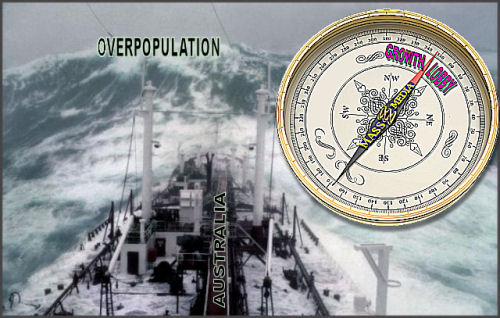 Some time ago I complained to MediaWatch that the ABC Vote Compass was biased due to its omission of the Population Growth Management issue. I am still waiting on their response. The results of the Vote Compass appear to support this complaint.
Some time ago I complained to MediaWatch that the ABC Vote Compass was biased due to its omission of the Population Growth Management issue. I am still waiting on their response. The results of the Vote Compass appear to support this complaint.
The Essential Report, 23 July 2013 was a poll that identified population growth management as a Top 15 Federal Election issue without including immigration as an issue. Immigration is one input to population growth management. The outcome is arguably the issue. Just as water shortage is an outcome/issue and water consumption is one input to this issue. Numerous other polls in recent years, including ANU Polling, have also identified population growth as a significant concern for 50% or more of respondents. The ABC's Vote Compass listed immigration as an issue but omitted Population Growth Management (which is a pure sustainability issue that should be untainted by racism or xenophobia). Was this pro population growth bias?
Agenda-setting theory applied to the ABC's 'Vote Compass'
Agenda-setting theory describes the "ability [of the news media] to influence the salience of topics on the public agenda." That is, if a news item is covered frequently and prominently the audience will regard the issue as more important. Agenda-setting theory was formally developed by Dr. Max McCombs and Dr. Donald Shaw in a study on the 1968 US presidential election. They demonstrated a strong correlation (r > .9) between what people thought was the most important election issue and what the local and national news media reported was the most important issue. By comparing the salience of issues in news content with the public's perceptions of the most important election issue, McCombs and Shaw were able to determine the degree to which the media determines public opinion. Since the 1968 study, more than 400 studies have been published on the agenda-setting function of the mass media, and the theory continues to be regarded as relevant. (ref. Wikipedia).
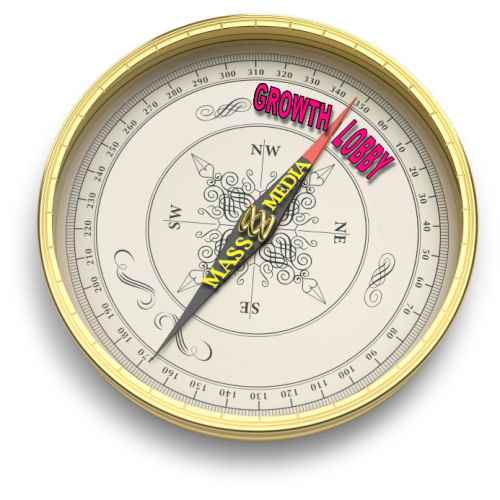
Neutral and/or Undecided
The Vote Compass Results show that of the 30 listed issues, the largest neutral (or undecided) votes went to:
- How many new immigrants should Australia admit? (35.9%)
- How much financial support should the Commonwealth provide to the car industry? (36.0%)
- How accessible should abortion services be in Australia? (39.4%)
- How much government regulation should there be on business? (41.1%)
- How much should the government spend on defence? (46.3%)
Were these high Neutral votes because of the complexity of the issues, a feeling of being unqualified to decide due to lack of information/understanding, or simply no opinion? The latter seems highly unlikely for the population growth management issue (which is a pure sustainability issue), and the issue itself is relatively simple to understand. Is the relationship between population growth, population size and migration being confused by government and media under-reporting the adverse impacts of rapid population growth while rapid migration continues? Does defining the issue under the banner of migration confuse and lead to any opposition being characterised as racist or xenophobic? How perfect this might be for those favouring rapid growth!
The smallest neutral or undecided votes went to:
- Medicare should offer basic dental care for everyone, even if people have to pay a higher Medicare levy. (7.4%)
- Boats carrying asylum seekers be turned back. (8.7%)
- Students in government and non-government schools should receive the same amount of federal funding. (9.0%)
- The government should further restrict foreign ownership of Australian agricultural land.(9.1%)
- Should asylum seekers who arrive by boat should not be allowed to settle in Australia (9.3%)
Was this because voters are confident that they understand these issues and/or feel they have enough information to form an opinion?
Balanced (and therefore Contentious/Controversial?)
The issues showing the most balanced agreement/disagreement (or more/less) rating (ie with the proportion of those agreeing within roughly +/-5% of the proportion disagreeing) are listed below with percentages (Neutral/Agree/Disagree):
- How may new immigrants should Australia admit? (35.9%/30.2%/33.8%) (Not covered by the ABC in lead up to the election. This is also a completely different issue to Population Growth Management which was not even listed as an issue)
- Boats carrying asylum seekers should be turned back (8.7%/43.5%/43.8%) (Covered by the ABC in lead up to the election)
- The national budget deficit should be reduced, even if it means fewer public services (12.6%/45.6%/41.8%) (Covered by the ABC in lead up to the election)
- When there is an economic problem government spending usually makes it worse (18.5%/40.1%/41.4%) (Related to the above)
- Live animal exports should be banned (15.9%/39.1%/45%) (Major issue covered by the ABC)
- Australia should end the monarchy and become a republic (21.5%/40.4%/38.1%) (Subject of a Referendum in 1999)
As shown by the percentages, the immigration issue is in a class of its own; with balanced agreement/disagreement combined with a very high neutral vote.
Some conclusions
Conclusions that could be drawn from these Vote Compass results include:
- The immigration issue has one of the highest neutral and/or undecided votes, which could reflect a failure of the ABC in promoting electoral literacy of this issue, relative to other issues
- The ABC did not cover the contentious immigration issue in the lead up to the election, which could reflect a failure of the ABC in promoting electoral literacy of this issue, relative to other contentious issues
- The ABC did not include the Population Growth Management issue at all, which reflects a failure of the ABC in promoting electoral literacy of this contentious issue, relative to other contentious issues
- Failure to cover the Population Growth Management issue, despite the results of the Vote Compass categorising the related issue of immigration as both contentious and somewhat misunderstood, indicates a degree of pro population growth bias by the ABC which is totally consistent with the ABC track record in this key area of National importance. [For more on this see Candobetter articles at: ABC bias]
Findings of the Essential Report, 23 July 2013: Which are the three most important issues in deciding how you would vote at a Federal election?
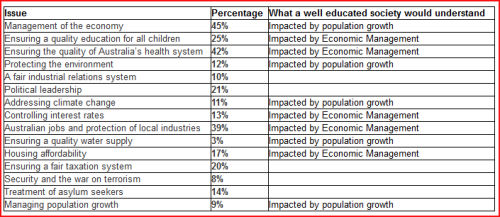
Punch Line
The Vote Compass confirms that all the major political parties (Labor, Liberal, Green) support ongoing rapid, migration-based population growth at or above current (2012) levels. In 2012 the level was 1.8% per annum (roughly 4 times the OECD country average based on CIA World Factbook Data versus ABS data for 2012).
The Vote Compass preferentially concealed the existence (under the term "other") of a party standing to represent voters concerned about population growth management (The Stable Population Party), while preferentially naming parties such as Wikileaks, Katter, Palmer. Wasn't this all simply part of the ABC's biased agenda setting?
Do results of the Vote Compass showing balanced agreement/disagreement combined with a large proportion of neutral or undecided votes, conclusively show the impact of ABC bias by omission of information in this key population policy area? Has the ABC selectively chosen to ignore an issue when it should fully understand that 50% or more of voters disagree with Liberal, Labor and Green policy? Does it really matter why this happened? Isn't it simply important to recognise the bias and make amends by correcting it? You can encourage the ABC by signing, and most importantly also forwarding, this petition. Thank you for supporting this cause:
Australia requires a public inquiry to determine a basis for the optimum rate of population growth
What, exactly, is the ABC's definition of bias in its Code of Practice? Here's what they say in their introduction: "The ABC has a statutory duty to ensure that the gathering and presentation of news and information is impartial according to the recognised standards of objective journalism....... Aiming to equip audiences to make up their own minds is consistent with the public service character of the ABC. A democratic society depends on diverse sources of reliable information and contending opinions."........ and so it continues ..........
Key findings from the ANU poll (October 2010 http://socpol.anu.edu.au/polls-and-surveys/anupoll/population and http://socpol.anu.edu.au/polls-and-surveys/anupoll/polls/governance and http://socpol.anu.edu.au/polls-and-surveys/anupoll/polls/environment) include:
- 44 per cent of Australians favour population growth, while 52 per cent want the population to remain at or below current levels.
- Opposition to population increase is broadly-based, with concerns about the effect on the economy and the environment.
- A majority of Australians think the world’s population is too large and is causing environmental damage.
- Half of the country say people should consider limiting the sizes of their families in order to minimise the impact of population growth.
- 16 per cent of Australians would want to see population increase through more immigration rather than through increased fertility.
- Two thirds of Australians say the ageing population will cause real problems — a majority are concerned about the government’s ability to tackle the problem and reject increased taxes as a solution.
‘Big Soy’ production in Argentina is dirty and dangerous

The world’s reliance on soy to feed factory farmed animals is having a devastating impact in Argentina.
RAW: Raw Truth of Factory farming and the destruction of lands and lives in Argentina
Factory farming is one of the biggest causes of animal cruelty on the planet. But it’s arguably one of the biggest causes of harm to us and the natural world too.
It’s why Compassion in World Farming created the Raw campaign – to expose this raw truth.
Their investigation tracks this harm from the factory farm to the soy fields of Argentina.
‘Big Soy’ production in Argentina is dirty and dangerous.
At the root of it is not the soy itself the problem but explosive human numbers all still demanding livestock products, such as eggs and meat.
This protein-rich bean – grown in fields as far as the eye can see – is destroying the health of Argentineans and their communities. All so that the beans can be shipped out to fatten up cows, pigs and chickens, mostly in factory farms.
Argentinean soy fields are in a toxic tale. Lands are being grabbed, people getting sick or dying, and there's intimidation and violence.
Around 10-12% of the original forests remain. It's been evastating. Some locals say they don't want the money, just healthy lives for their children.
Everywhere you go you see the shadow of the soy industry. The soy isn't being eaten by the people but being shipped thousands of miles around the world to fill the bellies of animals such as cows, pigs and chickens, mostly in factory farms. In this green gold rush, lands are being grabbed, people thrown off their land and displaced, and lives are being destroyed. There's little space left for locals' own animals.
Traditions of land care and heritage are being destroyed. Communal lands were shared for generations, thousands of hectares, are being swallowed up. Protesters are being rounded up and imprisoned. They are resisting the bulldozers razing the land and trees that provide oxygen and food.
Residues are in above the ground, and in the ground. The only thing that grows is soy beans, and then what's left is desserts. The catastrophic effect has been the clearing of land and mono-cultures. A large proportion of native forests have gone. It's gone on for 30 years now, and Argentina has one of the highest rates of deforestation in the world.
These massive fields of mono-cultures use pesticides on and in the ground, killing everything except the soy beans. Most of the soy is sprayed with a cocktail of chemicals. The real cost is borne by the communities and those who live near the crops.
Initially the green crops look deceptively assuring, but they started to see medical problems emerge: Cancer, leukaemia, lupus, rashes and birth deformities.
International researchers have shown that people get sick and suffer diseases when exposed to pesticides.
In 2010 doctors from the University of Cordoba came to see what was happening to respond to peoples' complaints. They agreed that exposure causes birth defects and illnesses. Intensive care units are full of people with deformities.
There are massive environmental, and social costs. People are afraid. It's all about big businesses and profits.
Factory farming isn't just an animal welfare issue. Intensive farming means intensive environmental destruction. We must end our addiction to soy, and meat that's not produced naturally. Exports from developing countries don't lift them from poverty. It just fills the pockets of the businesses and corporations. Large land owners are collaborating with corporations to feed the factory farms, and we need to reverse that trend.
Food production needs to be supported locally, by local governments and peasants. The land belongs to the people, not governments. 97% of soy is fed to animals, most of them factory farmed.
“Challenge” of population growth
Feeding the growing global population is a huge challenge and we can't rely on tackling this problem alone. We currently give a third of the world's cereal harvest to our livestock, and the animals use up much of the energy from the feed. If more plant crops were eaten directly by people, rather than feeding them to our farm animals, many more people could be fed.
Livestock's Long Shadow - FOOD AND AGRICULTURE ORGANIZATION OF THE UNITED NATIONS Rome, 2006 PDF file
Our planet holds 7 billion people, but nearly one billion people are currently hungry. Factory farming is not the answer to feeding the world; in fact the grain feeding of confined animals uses more food than it produces. (UNFAO, 2010, World Livestock 2011: Livestock in Food Security - ( See more )
Several kilograms of feed crops are needed for every kilogram of meat. (UNEP, 2011, World Food Supply: read more )
A much more sustainable, common-sense approach is for a higher proportion of plant crops to be eaten directly by people and for animals to be put back on the land.
ABS: Rising “challenge” of population growth
Australia’s resident population is estimated to increase to 35.5 million by the year 2056, based on current trends in fertility, life expectancy at birth and net overseas migration (Population Projections, Australia, 2006 to 2101, 3222.0).
The world’s population continues to grow at a rapid rate and in late 2011 was estimated at just under 7 billion. By 2050, it is projected that there will be 9.3 billion people on our planet, with nearly all of the population growth occurring in developing countries, including sub-Saharan Africa and India (United Nations, Department of Economic and Social Affairs, 2011). With a third more mouths to feed than there are today, FAO has estimated that by 2050, food production worldwide will need to increase by 70% (FAO, 2009b).
Australian Bureau of Statistics
It's considered a fait accompli that world populations will continue to soar in ecological overshoot, and that the our planet Earth has an obligation to lift it's game and increase food outputs by 70% to meet human demands. Native animals die off, become extinct and are “culled” due to starvation, but even intelligent economists and governments seem to think in terms of an anthropocentric, benevolent Mother Nature, or excessive human powers of manipulation, to overcome any mere natural limits and “challenges” of human overpopulation. We can't possibly cross the social, religious and political limits of suggestion a global plan to stabilise, and then reduce, human numbers through family planning!
Factory farms are the mass exploitation of sentient creatures, who must endure drastically cut life-spans, and perpetual deprivation, to feed masses of peoples in global markets. The costs of mono-cultures, pesticides, diseases, reproductive deformities, land grabs, deaths, land clearing, loss of biodiversity and sustainable farming are all part of the mere “challenges” of feeding swelling and uncontrolled human populations.
Short Critique of the Australian Greens policy on population growth and climate change
 The Australian Greens state:
The Australian Greens state:
“We are a party with a philosophy we stand by, a party with its eyes fixed firmly on caring for people and the environment as we meet the 21st century challenges. No one should be left behind as we embrace the environmental, social and economic opportunities in everything from high-speed rail, high-speed broadband, medical technology, solar power, food production, communication, education and technical innovation.”
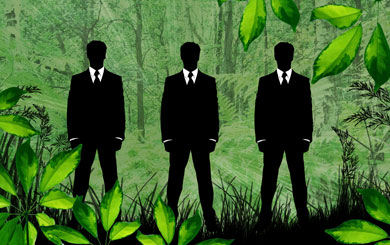 The Australian Greens will deliver a caring Australia, a safer climate and a proud global reputation. We are the strong, honest party who will stand up to those who protect their own interests to the detriment of the environment and deny everyone else a fair go. It is the Greens who will stand up for what matters.
The Australian Greens will deliver a caring Australia, a safer climate and a proud global reputation. We are the strong, honest party who will stand up to those who protect their own interests to the detriment of the environment and deny everyone else a fair go. It is the Greens who will stand up for what matters.
Einstein once said that you cannot solve problems with the same mindset that created them. (Quote from Christine Milne)
SOME FACTS
The Greens support 45 million population by 2050 which will increase greenhouse gas emissions by over 90 million tonnes per year.
We produce the highest emissions per capita on earth and the Green plan for addressing this is to continue chaotic expansion of our carbon based economy with a Carbon Tax magic wand to make the fairytale work.
This is a form of pro-Growth extremism that denies reality.
This is the same Population/GDP growth rates that Australia has used since Federation. This is an outdated mindset.
The Greens want to build a population driven, growth-based, economy that defies all the basic rules of sustainability.
The Gillard Carbon Tax was allegedly going to reduce emissions by roughly 60 million tonnes per year.
The Greens seem to think growing the population of Australia at 1.8% per annum (doubling every 40 years) is “Green” when actually it is unsustainable and categorised by numerous "experts" as socially, environmentally and economically destructive.
Once your own environment is destroyed you cannot help others.
The Greens seem to think chaotic expansion at existing extreme growth rates, which are 4 times that of the OECD country average, is a way to achieve disciplined improvement and welfare for all?
They also seem to support deteriorating economic fundamentals driven by extreme population growth – which will directly reduce Australia’s capacity to pay for foreign aid in the future?
Why aren't they calling for a public inquiry? :
Australia requires a public inquiry to determine a basis for the optimum rate of population growth
"Dear Mediawatch" - no reply received to complaint about ABC big population bias
 Dear Mediawatch, I sent my formal complaint to you about bias in the ABC Vote Compass on 1 October 2013. I also explained that this appears to be part of an ABC pro-growth propaganda campaign that breaches the ABC Code of Practice. I am now following up with you to request your response.
Dear Mediawatch, I sent my formal complaint to you about bias in the ABC Vote Compass on 1 October 2013. I also explained that this appears to be part of an ABC pro-growth propaganda campaign that breaches the ABC Code of Practice. I am now following up with you to request your response.
ANU polling in 2008 and 2010 consistently concluded that 50+% of people surveyed were concerned about population growth. Other polling has recorded similar results.
The Essential Report, 23 July 2013 selected Population Growth Management as a Top 15 Federal Election issue.
The above polls were all statistically accurate to within (roughly) +/-3%.
The ABC Vote Compass contained 30 so-called Federal Election Issues, but excluded the Population Growth Management issue despite the large team of (so-called) experts involved in preparing the Vote Compass. Their work omitted the issue (How could this happen?) and didn't take the advice of documented complaints about omission of population growth made by the public when they were consulted on the issues selection process for the Vote Compass (Why?).
I have provided factual and documentary evidence to support my claims.
The essence of the complaint was that the ABC omits population growth from virtually all political interviews and public policy debate in a manner so comprehensive and pervasive that it does not comply with the ABC Code of Practice requirements for "impartiality and diversity of perspectives". You, like the ACMA, have so far supported the ABC in this approach to extreme growth. The term "extreme" means roughly 4 times the respective 2012 OECD country averages for population growth and GDP growth; and growth in a category occupied by the most underdeveloped, environmentally degraded dictatorships on earth - where the order of the day is near total lack of social welfare and human rights.
There is a growing global movement championing the cause of moderating growth. The ABC talks about these issues in a politically "offline" context but seems unable to engage politicians on the issue. The Greens also have an official policy of extreme population and GDP growth rates as confirmed by the ABC Vote Compass.
The ABC appears sympathetic to pro-Carbon Tax "Green Evangelists" that appear to have hijacked the "Green Flag" for their own version of a rapid-growth agenda cloaked in environmental love. [See attachment criticising Australian Greens] The combination of extreme growth and "Greenism" seems fatally flawed, environmentally destructive and unhumanitarian as explained in my Petition (see below).
Please sign my petition
sign my petition [...] ; or do you prefer to let the growth machine roll quietly on; unchallenged in any way?
http://www.youtube.com/watch?v=8x98KFcMJeo (David Suzuki 3 minute video on growth)
UK Labour's surrender monkeys dare not criticize Britain's conscript economy
|
This article was originally published on Russia Today 16 August 2013 with the disclaimer, "The statements, views and opinions expressed in this column are solely those of the author and do not necessarily represent those of RT." Whilst on-line news services such as Russia Today Press TV are good sources from which to learn the truth, particularly about the conflict in Syria, which is contrary to what we are fed from the mainstream news media (msm), they unfortunately mirror the msm's political correctness in regard to immigrants and claimed asylum seekers. A substantial number of articles from such news services have reported on the plight of prospective immigrants attempting to enter countries such as Canada, the United States, Europe and Australia, without regard to the already dire economic circumstance of many native inhabitants of those countries, which can only be made worse by the arrival of more immigrants also seeking shelter in a tight housing market and employment where unemployment is already high. This article by Tony Gosling is a welcome change from Russia Today's usual political correctness on the immigration question. A similar viewpoint was recently put by Australian Labor Party MP Kelvin Thomson at the inaugural meeting of Victoria First on 1 December 2013.
Britain's shadow minister for borders and immigration, Labour's Chris Bryant, promised to take on the big corporations this week. But as his embargoed speech was leaked to big business, the nation watched his political resolve melt into nothing. |
Friends and corporate funders of the ruling Conservative-led coalition have been sacking thousands of workers. They then market those same jobs to cheaper foreign workers, bringing misery to Labour's traditional working-class supporters.
Frequently those jobs are not even advertised in the UK. Former employees have to re-apply for their old jobs so long as they're prepared to accept worse pay and conditions.
Standing nervously behind the workers directly hit by this practice are millions of other apprehensive wage earners. They can see how this further corrodes what has become an increasingly brutal job market.
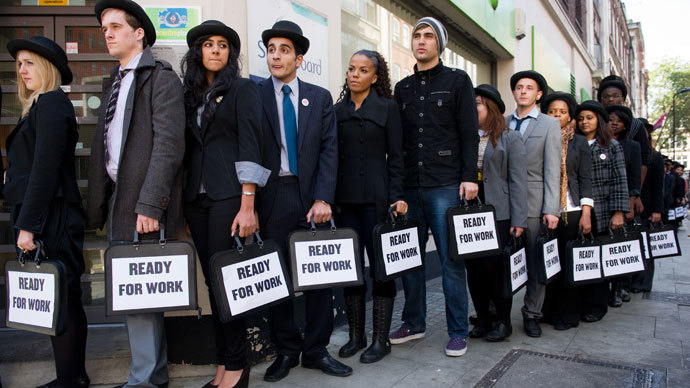
It is the dedication of staff, not just how much they're paid, that determines how good a service the public receives. Staff who know they can be sacked at the drop of a hat do what they are told by their managers out of fear, rather than respect. Before long that culture of fear impacts on everything a business touches.
From the voice on the phone, through quality control, to the customer facing staff, as the company's commitment to the employee goes down, so the glue that holds the business together starts to come unstuck.
The figures, of course, look good on paper. Boardroom presentations with those efficiency graphs zigzagging gradually up accompanied by photographs of smiling staff in neatly-pressed uniforms.
But as well-paid lobbyists for these multinationals successfully demand the erosion of employment rights, trust in these cost-cutting companies is undermined. Trust doesn't figure on the balance sheet, but it's the only truly important quality a company has (or doesn't have).
Britain's opposition Labour party immigration minister, Chris Bryant.(Reuters / Luke MacGregor)
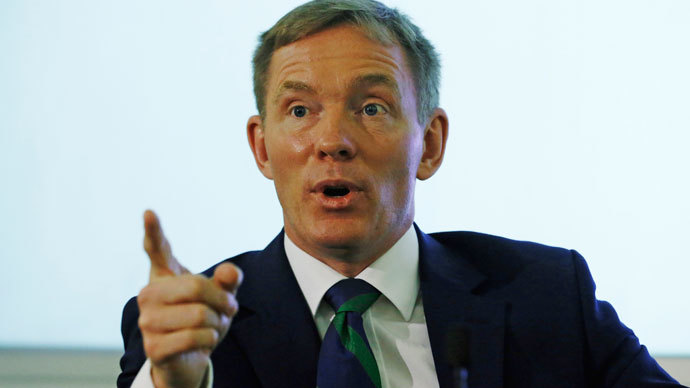
Britain's opposition Labour party immigration minister, Chris Bryant.(Reuters / Luke MacGregor)
This is one of the chief reasons why recruitment agency Office Angels found last week that over half of Britons in work want out of their present job, for the first time in decades. Off the balance sheet again: an unhappy company is a bad company.
Practices like these are turning the UK into a "conscript economy". Thirty years of retreat from Labour's 1970s policy of full employment has tipped the balance between employer and employee off the scales, until the employer holds all the cards.
Yet, despite the slump, there seems no let-up in the flood of economic migrants moving to Britain. Last week's net migration figures show that in the year to June 2012, 165,000 people, or nearly 500 a day, moved to the UK.
On New Year's Day 2014, Bulgarians and Romanians too are about to be allowed to work in the UK — boosting the net figure to over 200,000.
This influx is doubly bad, cutting both ways into UK disposable incomes. It helps keep house prices artificially high, and wages artificially low. So Labour has realized that not all critics of immigration are racists and, we are told, is seeing the error of its ways.
Party chiefs, for the first time, have been weighing the rights of the British worker who loses their job against the right of the migrant to work anywhere in the EU. Weighing up, too, the good work an immigrant worker might do, against the cost to the British taxpayer of yet another British family on the dole.
So, for Britain's opposition party, standing up for dwindling employment rights should have been an open goal.
Yes, migrant labor is justified and welcome when a country has full employment but with, for millions, wages not enough to live on and real unemployment hovering around 10 percent, to low-paid workers bringing in migrant labor just drives them further into poverty.
So Labour's Chris Bryant was going to weigh in this week to explain that Her Majesty's Opposition now thought it was wrong. A plea both to the origins of the Labour Party, standing up for the victims of cruel and greedy bosses... and to pragmatism. That it wasn't racist to discourage economic migration.
Reuters / Andrew Winning
"Take the case of Tesco, who recently decided to move their distribution centre...." he was due to say, "...staff at the original site, most of them British, were told that they could only move to the new centre if they took a cut in pay. The result? A large percentage of the staff at the new centre are from the Eastern bloc."
But Tesco's friends in the London media tipped them off with a leaked copy of the speech, so after a call to Labour Party headquarters from Tesco this became:
"Take Tesco. A good employer and an important source of jobs in Britain... Yet when a distribution centre was moved to a new location existing staff said they would have lost out by transferring and the result was a higher proportion of staff from A8 countries... Tesco are clear they have tried to recruit locally."
Rarely do we get the opportunity to see so transparently how meek our politicians have become in the face of corporate lobbying. Tory Tesco effectively rewriting the speech of an opposition politician, no doubt with strong-arming from Labour Party apparatchiks, too.
Bryant's key allegation about the cut in pay disappeared. Instead, Tesco is "a good employer" that has "tried to recruit locally." Dead on the cutting-room floor, too, is another fact that many low-paid UK jobs are not even advertised in Britain any more.
To the tune most of us know as "Oh, Christmas Tree" or "Tannenbaum," Labour Party activists used to traditionally sing "Let's Keep the Red Flag Flying Here" on May Day, which called for a worldwide, worker-managed utopia with no borders. But when the Labour Party is no longer allowed to criticize practices that take food out of children's mouths, throw hard-working people out of a job, and possibly onto the streets, that party may as well pack its bags.
If the present leadership is not purged, Labour may go the whole hog and, as in Greece, show its true blue colors by going into a formal coalition with the big corporations.

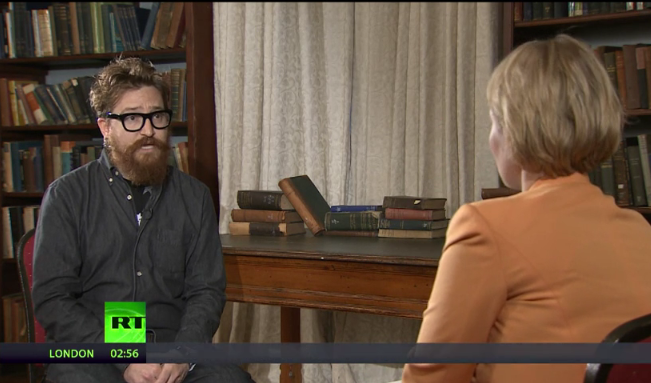
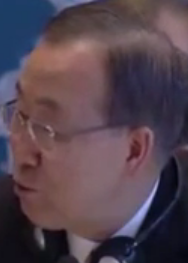
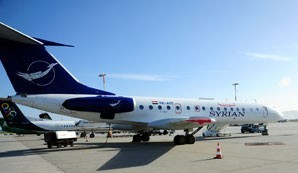
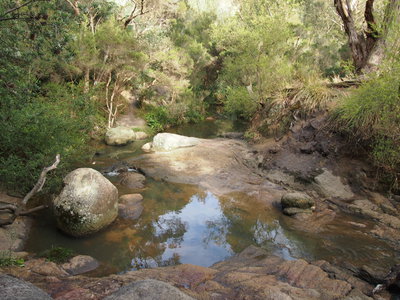
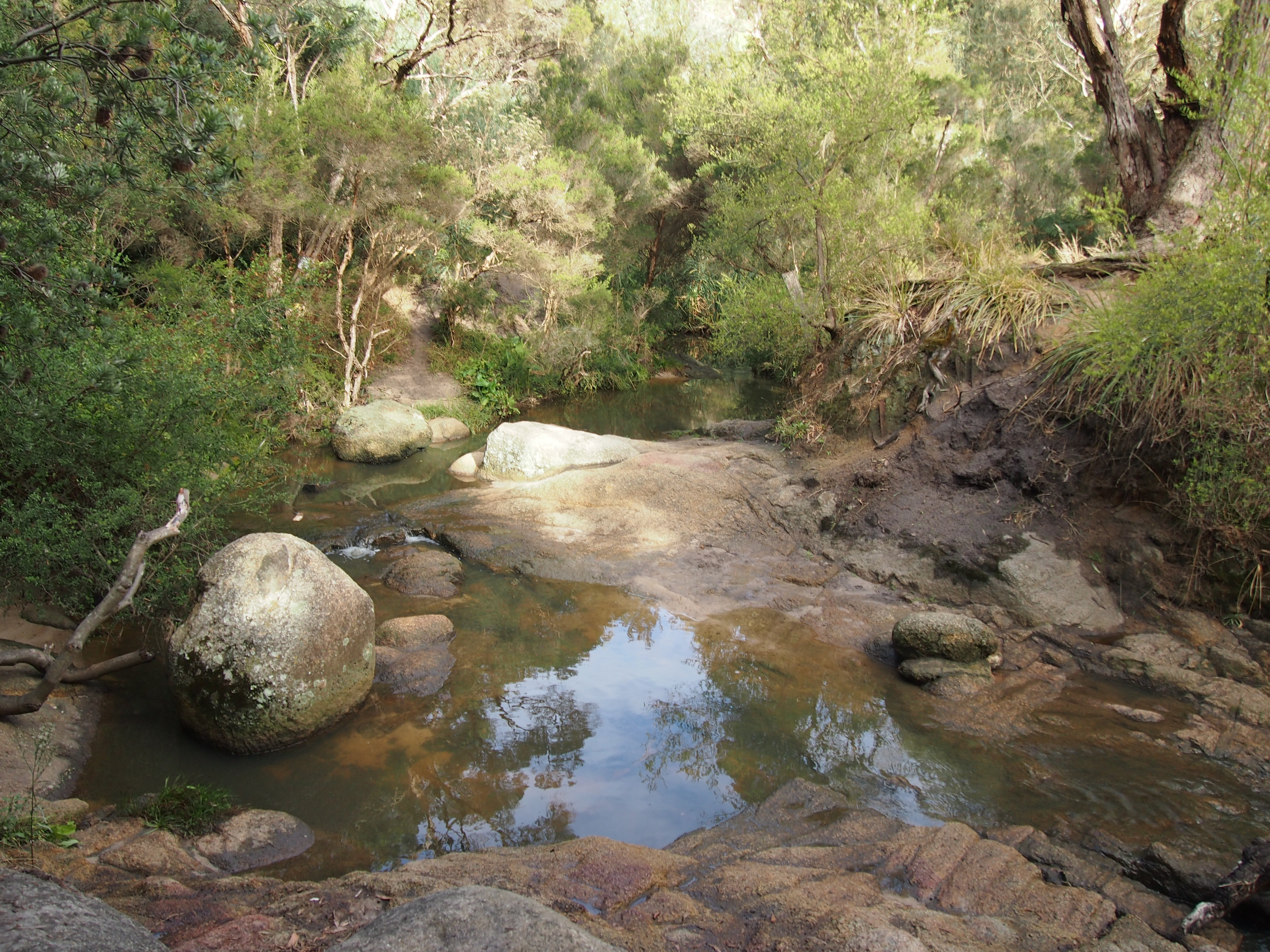
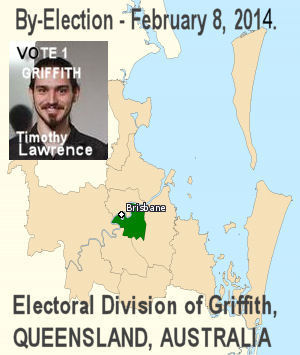


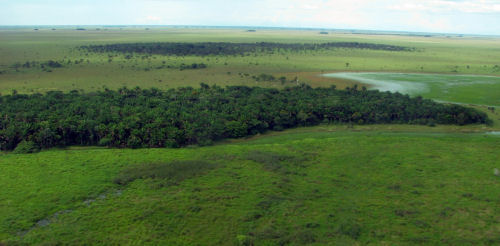
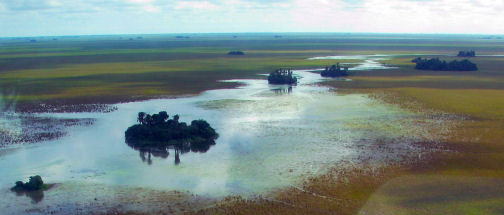
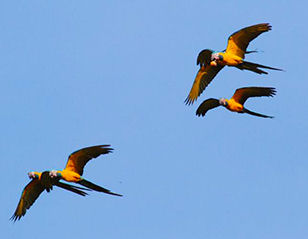
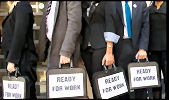
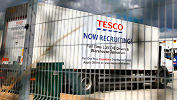
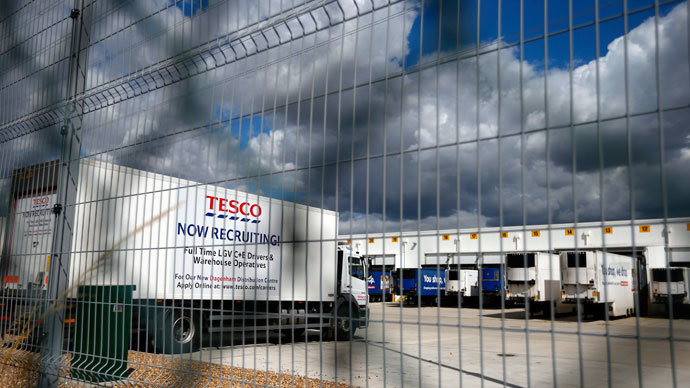
Recent comments